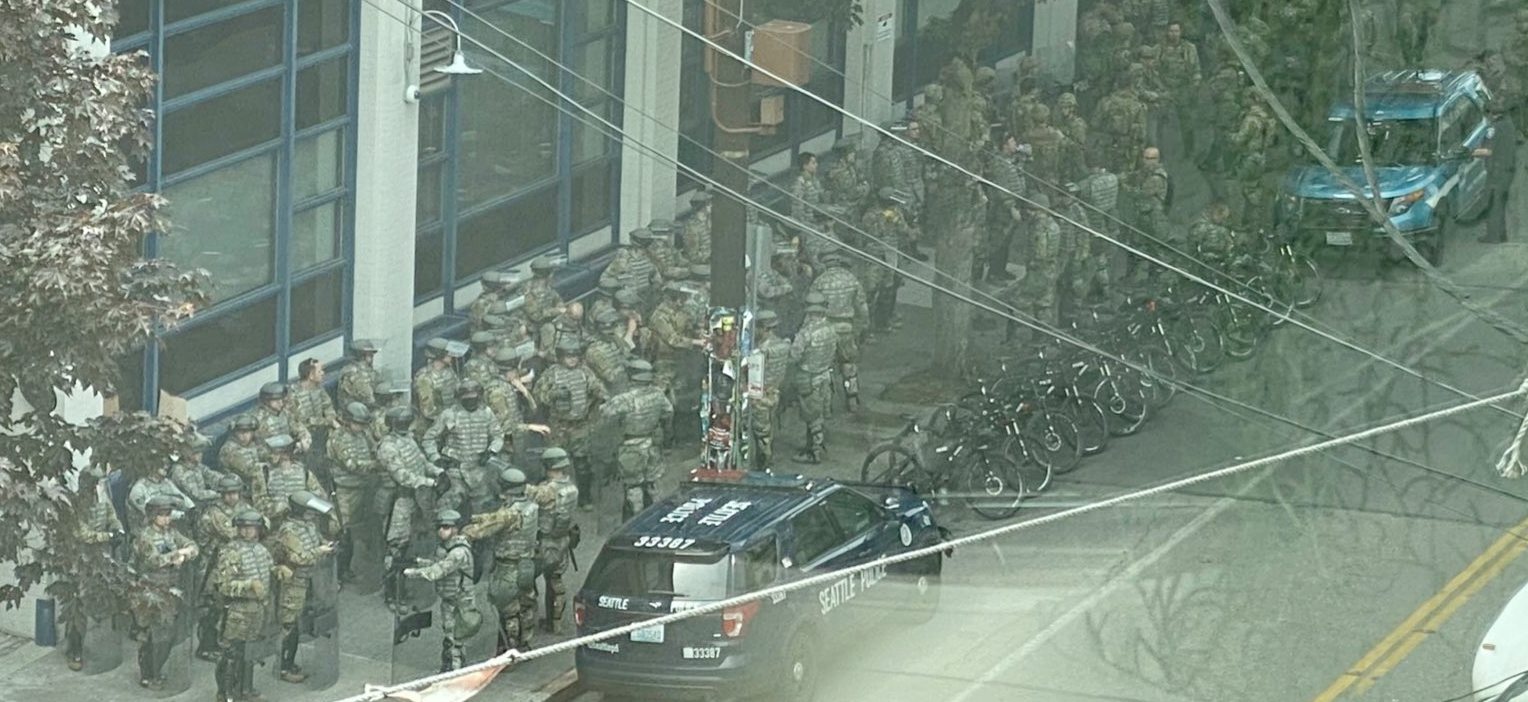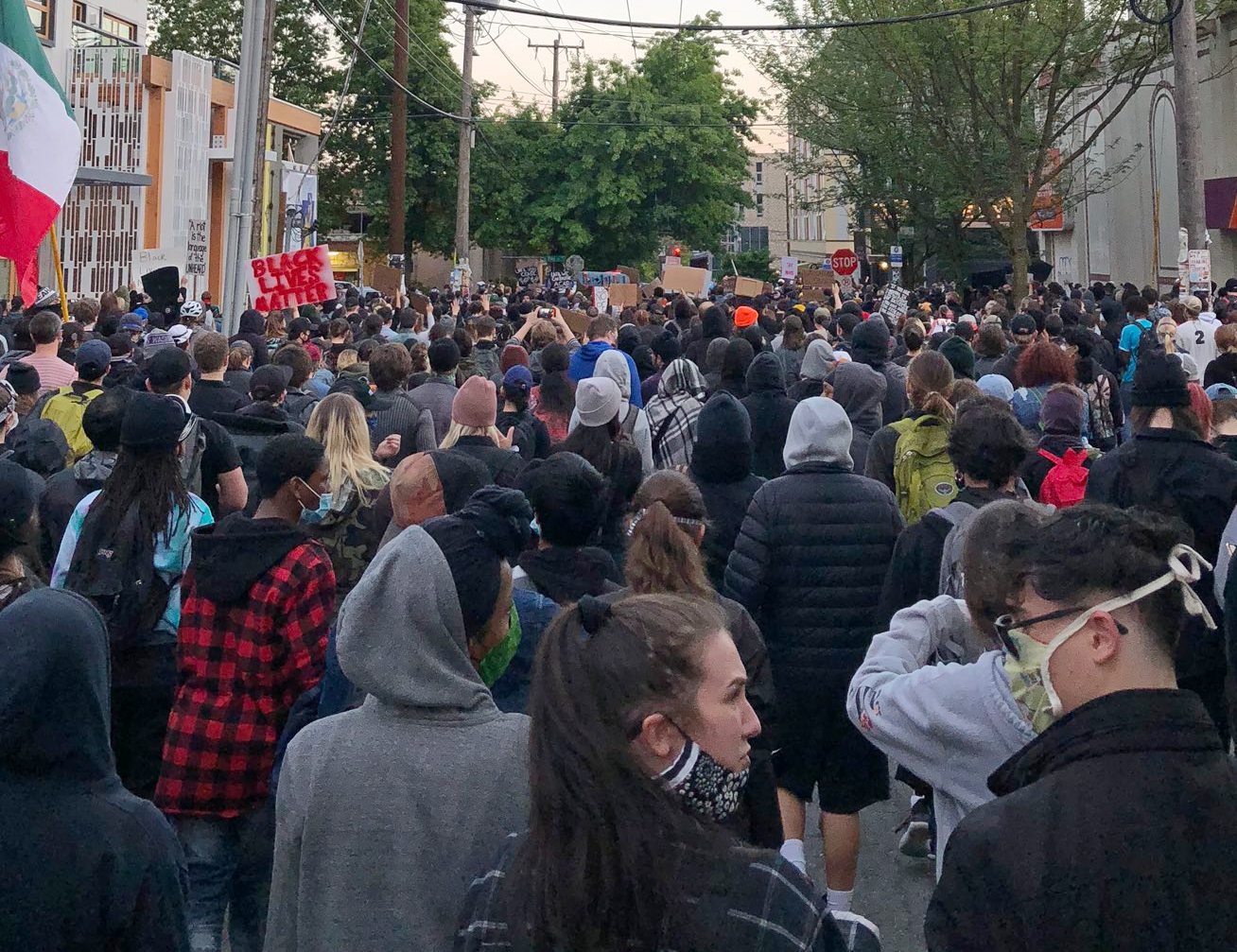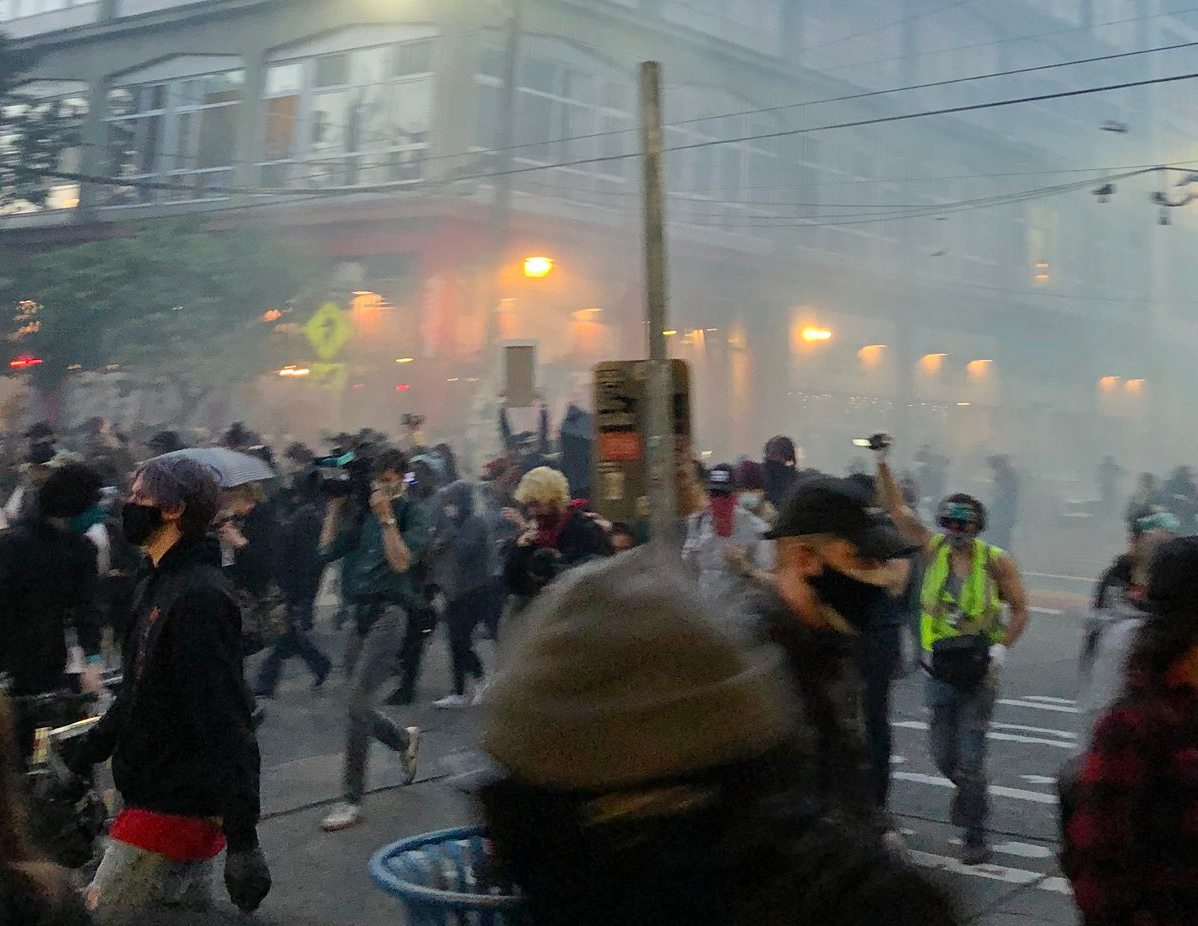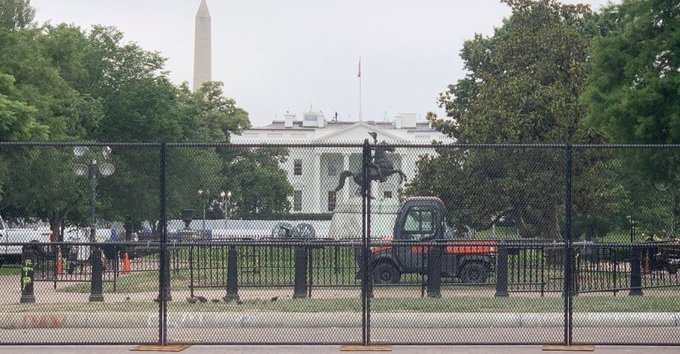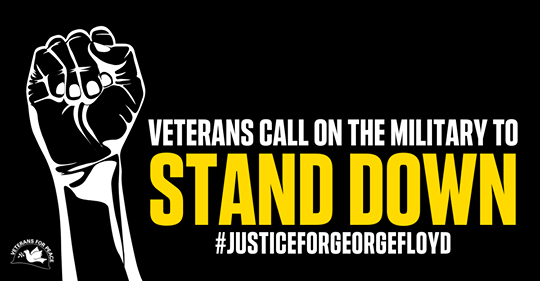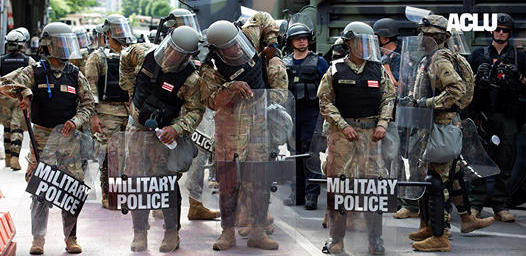
|
June 6, 2020 - No. 20 Brutal Killing of George Floyd Yes to
Resistance! |
|
|
The Bankruptcy of U.S. Institutions

Black Panthers at the front of march for justice for George
Floyd in Atlanta, GA
to protect participants.
The current situation in the United States shows the anarchy and chaos into which the U.S. government and financial oligarchy have plunged the country, because that is all they have to offer in their efforts to save the imperialist system and their absolute power. The president's response to the broad opposition movement of the people and youth to U.S. governance, police and military power illustrates the bankruptcy of U.S. institutions, the obsolete constitution and undemocratic system. His response is anarchy and violence, the imposition of police and military powers, total contempt for the people, war, aggression and dictate. The situation is such that the powers of the dominant U.S. elite, with the darkest and most reactionary forces in place, have declared that what the United States cannot dominate, it must destroy. This applies not only abroad but also at home. If we cannot contain the anger of the people and youth who aspire to a bright, just future, free from discrimination, impunity, exploitation and war, we must subdue them and force them to submit, the ruling elite say.
 The images,
reports, interviews and videos available of speeches by the youth
reveal this anger, this search for modern solutions, new and modern
mechanisms which enable them to be an active force which can pave the
way for progress in the United States and contribute to the same for
the peoples of the world.
The images,
reports, interviews and videos available of speeches by the youth
reveal this anger, this search for modern solutions, new and modern
mechanisms which enable them to be an active force which can pave the
way for progress in the United States and contribute to the same for
the peoples of the world.
The Communist Party of Canada (Marxist-Leninist) has long pointed out that within the conditions of neo-liberalism, the authorities in place in various countries are in contradiction with the conditions. This is evident in the United States with the murders, the military response and during the COVID-19 pandemic. The result is an extremely disturbing situation for the U.S. working class and people, and for the peoples of the world. Settling scores with the U.S. authorities is the task which the peoples of the world are joining the working class and people of the United States to take up.
The ruling authority appears as the greatest obstacle to the peoples of the United States and the world in their efforts to settle scores with the imperialist system and its state, and to emerge as one humanity which controls the conditions it faces and that has the authority to govern itself and to face the conditions objectively.
The current situation is one sign of the enormous dangers which face the American people and the peoples of the world. In this period of pandemic, which requires the collective effort of the world to overcome it, the situation that prevails in the United States with the governance of private interests at the helm is very fragile and dangerous. Everything is done to block the collective response of the people and this block, this wall called American democracy, blocks the whole of humanity.
In Canada and Quebec, the governments and cartel parties have quickly, and even jointly, made declarations and adopted motions to denounce racism and discrimination, rejecting the need to modernize the state institutions that propagate the racist arrangements and governments' racist policies as part of everything they do to ensure that the people do not vest decision-making power in themselves. This blocking of the New is systematic and objective. It persists and suffocates.
The people must persevere in transforming themselves into an organized force, which aims to play its conscious role, which activates the human factor/social conscience to place itself at the heart of decision-making. The opposite will become a block.
Let us firmly support the struggle of the people and the youth in the United States!
(Translated from the original French by TMLW.)
Trudeau Government as Always Covers Up the
Fact that Racist Attacks Are State-Organized
Everything is done to hide that it is the U.S. state which is anti-worker, sexist, racist and anti-immigrant as well as profoundly anti-communist and that police impunity and violence are systemic, not a matter of some "bad apples." One of the ways this is done is by expressing opposition to racism and police impunity in words while hiding that they are inherent in anachronistic constitutions which enshrine property rights in the name of "the people." Another way this is done is by making Trump and the need to elect someone who upholds the Constitution the issue. Along with this, every epithet in the book is used to portray the working people of the United States who voted for Trump as rabid, crazed zealots who are trampling the rights of the people in the mud.
A good example of
how this is done is provided by Prime Minister Trudeau. In his daily
briefing on June 1, ostensibly to inform about measures being
implemented by the federal government to deal with the COVID-19
pandemic, Prime Minister Trudeau stated, "I want to start by addressing
the situation that's unfolding south of the border which is also having
an impact here at home. For far too many Canadians the images and
stories coming out of the U.S. are all too familiar. As a country we
can't pretend that racism doesn't exist here. Anti-black racism is
real, unconscious bias is real, and systemic discrimination is real and
they happen here in Canada. Over the weekend we saw thousands of people
gather across the country to join peaceful protests against anti-black
racism. By standing together and denouncing the few who would try to
derail these demonstrations, Canadians are sending the message that
they will never tolerate injustice. To young black Canadians, I hear
you when you say you are anxious and angry, when you say that this
brings back painful experiences of racism that you've faced. I want you
to know that I am listening and that your government will always stand
with you. Together we will keep taking meaningful action to fight
racism and discrimination in every form. The status quo where people
face violence because of the colour of their skin is unacceptable. No
parent should have to once again explain to their kids that they or
their friends might face racism. It is time, it is past time for this
to change. As leaders and allies we must do the hard work needed to
listen and learn. We must ensure that everyone is safe and respected.
That includes journalists who need to be able to do their work on the
front lines to expose the truth and tell the stories we need to hear
and we must, as Canadians, always keep working together to build a
fairer, better, more equitable country for all."
Throughout the U.S., workers, youth and people from all walks of life have risen up to resist the ongoing state attacks on African Americans and minorities, triggered by the killing of George Floyd in Minneapolis on May 25. Across Canada and throughout the world actions have been held in solidarity with the just cause of the American people to end systemic racism and police impunity. That solidarity is based on having a common cause and experience of state-organized racist attacks which are part of the modus operandi of the ruling elite throughout the imperialist system of states.
The hypocrisy of
Trudeau's "I want you to know that I am listening and that your
government will always stand with you" on the first anniversary of the
release of the report of the National Inquiry into Missing and Murdered
Indigenous Women and Girls, within days of the death of a young
black-Indigenous woman in Toronto during an interaction with police and
three days before the death of an Indigenous woman in Nova Scotia at
the hands of police, fools no one. Video footage of police violence
against a man in Nunavut is also presented as an aberration, not par
for the course. The chief of police in Saskatchewan going on bended
knee pledging that the police must do better is given wide coverage
while covering up that in that province police killings of Indigenous
women and men are notorious. The "we're all in this together" message
and lecturing Canadians that "we" have to do better, has become the
mantra for denying what really takes place. How do you do the G20
assault on Canadians "better?" How do you do "serve and protect" better
when you are under the command of U.S. military and police forces?
Trudeau wants us to believe that his government is "addressing the situation that's unfolding south of the border" by attempting to divert, using not-so-subtle blaming of the Canadian people -- "we're all in this together" -- and only finding it in his heart to denounce "the few who would try to derail these demonstrations," while maintaining a posture of "non-interference" when it comes to condemning the police actions and Trump's threats to use the military against the unarmed people. Trudeau and Deputy Prime Minister Freeland, are self-righteously repeating that it is not up to them to tell other leaders how to conduct themselves. This is the same Trudeau and the same Freeland who have recognized the imposter Guaidó in Venezuela, engaging in not just words but outright interference in the internal affairs of that country and others in the name of "Canadian values" and "the rule of law."
What is being expressed in the solidarity actions in Canada is both support for the just struggle of the U.S. working class and people and the determination of the Canadian people to put an end to racism and state-organized racist attacks in Canada as well.
Inability to Unite the Military Bureaucracy --
a Serious Problem Facing the U.S. Ruling Elite
One of the jobs of the presidency of the United States is to preserve the union, which requires uniting the military bureaucracy. This bureaucracy, which has grown to massive proportions, is part of the state machinery that exists from one presidency to the next. It is the state and its monopoly on use of force that ensures the continuity of the rule by the financial oligarchs and narrow private interests that have seized control of the U.S. state. While governments change from one election to the next, today, at a time when the existing institutions for governance -- for example, Congress, political parties, elections -- are dysfunctional and no longer serve to resolve conflicts, the inability to unite the military bureaucracy poses an increasing threat to the union itself.[1] Calls issued by generals and sections of the military indicate what happens when the military itself becomes politicized and does not see itself represented by the president who is also commander-in-chief. Many of the statements from military personalities as well as others call for following the Constitution when and if the military is to be deployed against the people of the United States. What they tend to cover up is that its very deployment in violation of the Constitution shows that the Constitution is no longer the Authority in the United States.
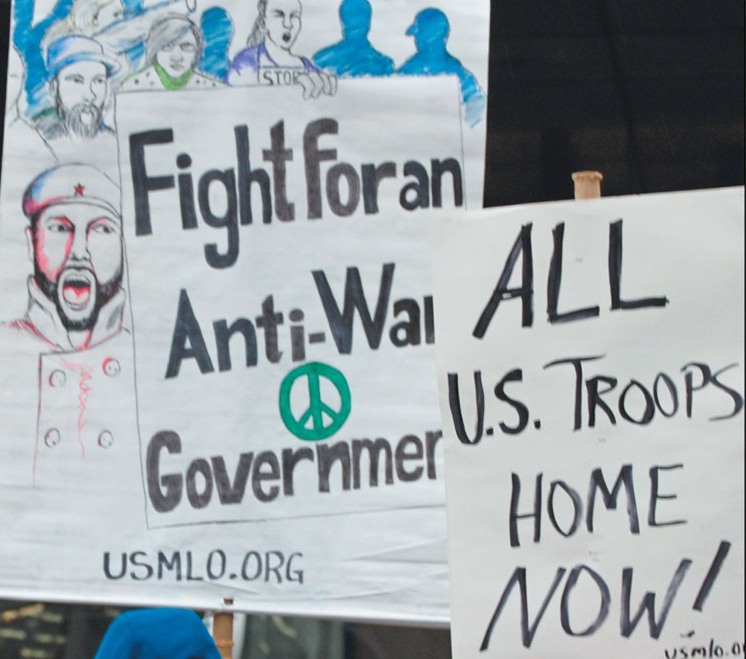 When various
generals and military officials, mostly retired, speak out against the
president, in this case Donald Trump, it is contrary to military
standards requiring military officials to remain neutral so as to
ensure their commitment to whoever becomes commander-in-chief. They
swear oaths of loyalty to the Constitution, not to the president. For
some time since the neo-liberal anti-social offensive was unleashed in
the mid-eighties and narrow private interests started directly
competing to take over the state power, members of the Joint Chiefs of
Staff -- the top commanders of the Navy, Marine Corps, Army and Air
Force -- have been making public statements about the actions of the
president. For example, before the current unfolding events, in
response to the statements made by Trump about demonstrations and
violence by Nazis and the KKK in Charlottesville, North Carolina in
August 2017, statements by military commanders were seen as an open
rebuke of Trump. News reports emphasized that the statements "indicated
deep unease in the Pentagon" and a "dramatic break with precedent" of
no public statements by the military that contradict the president.[2]
When various
generals and military officials, mostly retired, speak out against the
president, in this case Donald Trump, it is contrary to military
standards requiring military officials to remain neutral so as to
ensure their commitment to whoever becomes commander-in-chief. They
swear oaths of loyalty to the Constitution, not to the president. For
some time since the neo-liberal anti-social offensive was unleashed in
the mid-eighties and narrow private interests started directly
competing to take over the state power, members of the Joint Chiefs of
Staff -- the top commanders of the Navy, Marine Corps, Army and Air
Force -- have been making public statements about the actions of the
president. For example, before the current unfolding events, in
response to the statements made by Trump about demonstrations and
violence by Nazis and the KKK in Charlottesville, North Carolina in
August 2017, statements by military commanders were seen as an open
rebuke of Trump. News reports emphasized that the statements "indicated
deep unease in the Pentagon" and a "dramatic break with precedent" of
no public statements by the military that contradict the president.[2]
Of course, the impression created is that the military upholds the U.S. Constitution, which is presumably not racist to the core. What's more, the military is notorious for its brutal racism, within its ranks and towards the peoples of the world. Soldiers are routinely trained to view peoples subjected to U.S. aggression as less than human, with various racist epithets used as part of this. Whipping up intolerance and hatred so as to convince soldiers to slaughter "the enemy" is considered a necessary part of military training. This shows that the aim of the comments made by military personalities is hardly to stand against the racism that has imbued the U.S. state and its military "since 1775," and has been and remains integral to its genocide against Indigenous peoples, enslaved Africans and now African Americans and peoples targeted abroad, in all countries of Asia, Africa, Latin America and the Caribbean. Furthermore, it covers up that today not a few of the police, military units and special services deployed across the United States to attack immigrants, migrants and African Americans are directly under Northern Command "to safeguard the security of the United States."
The statements and policies pushed by Trump are certainly destructive of the civil power and show the desperation of the narrow private imperialist interests to destroy whatever they cannot control. But the statements which purport to defend the civil power as enshrined in the Constitution are also desperate because such a civil power clearly no longer exists. It was set up to protect private property interests from the get-go and has now been usurped by the cartels and coalitions who run the show today.
There are all kinds of comments about racism from rulers whose main job is to hide the truth of the matter to divert attention from the fact that the U.S. ruling class is imbued with racism and organizes racist attacks and funds and arms Nazis and the KKK and military groups so as to maintain their rule and preserve their union. Just like the violence in Charlottesville two years ago, the treatment of blacks and minorities in the United States are a state-organized provocation which serves to set the people fighting amongst themselves while letting the state off the hook.
Thanks to the resistance struggle of the people this is not succeeding.
At the same time, the statements by top-ranking military officials and politicians reveal the deep disunity and conflicts within the ruling circles. This also indicates the grave danger of civil war and potentially broader imperialist war.
Aggressive war is one means past presidents have used in their attempts to unite the bureaucracy. But the contradictions within the ranks of the oligarchs over control of the decision-making power are so sharp that even this is no longer effective and now the attacks on the American people themselves are escalating. This too will fail to solve the current problems the rulers face, which is why every effort is being made by the rulers to preserve the union and its constitutional form, while imposing a government of police powers, concentrated in the presidency. The façade of democracy and civilian rule is to remain but the governing institutions for that are being eliminated, making the ability to sustain the rule increasingly difficult and unpredictable.
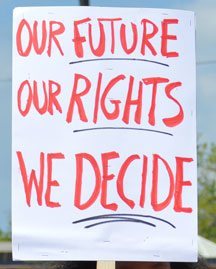 For the people
this poses the necessity to organize on a basis which is consistent
with the needs of the times and what is revealed, which is that the
people need to vest the decision-making power in themselves. Today it
is their resistance which sets a new direction for political affairs.
The problem is not choosing sides among the rulers or defending an
outdated Constitution that enshrines slavery and protects property
rights, not human rights. Organizing work today strives to create a
democracy of the peoples' own making, where the people control the
decision-making power.
For the people
this poses the necessity to organize on a basis which is consistent
with the needs of the times and what is revealed, which is that the
people need to vest the decision-making power in themselves. Today it
is their resistance which sets a new direction for political affairs.
The problem is not choosing sides among the rulers or defending an
outdated Constitution that enshrines slavery and protects property
rights, not human rights. Organizing work today strives to create a
democracy of the peoples' own making, where the people control the
decision-making power.
The U.S. Constitution is not the defender of the rights of the peoples. It is in the service of the enemies of the peoples both at home and abroad. To present the conclusion that the attacks on black people and the military response to protests and calls for justice show the necessity to defend the Constitution, is a ploy to deprive the people of their own political power. The aim is to divide the people further to play into the hands of the U.S. ruling class. There is no use debating Trump's irrationality and incoherence because such debates do not give rise to a modern democratic personality. On the contrary, they serve to perpetuate the narrative that under current state arrangements, someone better can be elected and pass good policies. It serves to perpetuate the disempowerment of the people.[3]
A grave situation is facing the U.S. working class and broad masses of the people of all nationalities. It requires a sober assessment and serious analysis of the situation so as to differentiate between the enemies of the people and their friends, between those whose aims are to liberate the people and those whose aims are to tighten their shackles. All those who want to see justice done are rising as one. They are condemning the atrocities of the state as well as the criminalization of politics in attempts to frustrate efforts to divert and split the people's struggle for genuine peace, freedom and democracy. In a democracy created by the people themselves, not alleged representatives of the people, people of all backgrounds will enjoy equality and rights as defined by themselves on a modern basis. Modern institutions of government and a modern constitution can be developed in the course of the struggle for the political empowerment of the people.
The massive demonstrations taking place at this time are evidence of the fact that it is the resistance movement that will find the way forward. This movement brings people together from all walks of life and backgrounds in a common cause for peace, justice and democracy. It is proof that we are one humanity engaged in one struggle and that we will prevail.
Notes
1. For the U.S., the issue of uniting the military bureaucracy is particularly important because there is not a single, unified military. Rather, there are contending branches that both collude and compete for resources and power. There are also the many armed agencies within the country, like those at the border, the FBI, the Drug Enforcement Administration (DEA), and many others, as well as the highly militarized police forces created since 9/11, all of which are ultimately under Northern Command. These all must be kept in check and united behind the presidency, something which thus far Trump is not succeeding in doing.
2. "The Army doesn't tolerate racism, extremism, or hatred in our ranks," General Mark Milley, chief of staff of the Army, tweeted on August 16, 2017. "It's against our values and everything we've stood for since 1775."
Marine Commandant General Robert B. Neller tweeted on August 15, 2017 that there is "no place for racial hatred or extremism in the Marine Corps." Admiral John Richardson, the Chief of Naval Operations, on August 13, 2017 posted a statement on Twitter and Facebook that called the events in Charlottesville "shameful" and "unacceptable." He said, "The Navy will forever stand against intolerance and hatred."
General David L. Goldfein, chief of staff of the Air Force, tweeted August 16, 2017 that he stood "together with my fellow service chiefs in saying that we're always stronger together."
3. See Who Said What about the current events below:
Who Said What
• Retired General James Mattis, Former U.S. Secretary of Defense
• Retired Admiral Mike Mullen, Seventeenth Chairman of the Joint Chiefs of Staff
• Barack Obama, 44th President of the United States
Dangerous Warmongering Exercise
of Northern Command
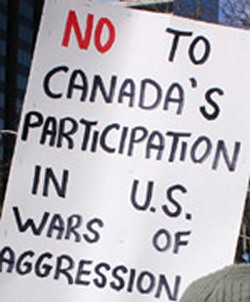 On May 28, U.S. Northern
Command (NORTHCOM) launched a four-day war exercise over the northeast
coast of the U.S. and Canada. It was unprecedented in that it also
involves U.S. Space, Transportation and Strategic commands.
On May 28, U.S. Northern
Command (NORTHCOM) launched a four-day war exercise over the northeast
coast of the U.S. and Canada. It was unprecedented in that it also
involves U.S. Space, Transportation and Strategic commands.
The U.S. Navy Times reports that "The aircraft carrier Harry S. Truman strike group and its air wing will join Canadian fighter jets [CF-18s -- TML Ed. Note] and Air Force F-15s in conducting intercepts against adversary aircraft during the exercise, which began Thursday [May 28] and will wrap up Sunday [May 31].
[...]
"An Air Force B-1B bomber will be used as the enemy aiming to infiltrate U.S. airspace as well.
"Along the way, brass hope the exercise can strengthen the military's ability to communicate and share real-time information in such a scenario, according to NORTHCOM.
"U.S. Transportation Command is providing refueling tankers along the coast to support defending forces during the exercise, and Space Command is providing satellite communications and GPS.
"'Leading complex multi-combatant command operations across multiple domains demonstrates our readiness to defend our homeland regardless of COVID-19,' Air Force General Terrence O'Shaughnessy, the head of NORTHCOM (and NORAD), said in a statement."
On May 29, U.S. Northern Command tweeted "Gen. O'Shaughnessy, @NORAD Command & NORTHCOM CDR, visited USS Harry S. Truman for our one-of-a-kind #Homeland Defense exercise in the Atlantic! Despite #COVID19, we are ready to defend the Homelands!"
The Truman Strike Group is comprised of the flagship Nimitz-class aircraft carrier USS Harry S. Truman (CVN-75) and nine squadrons of Carrier Air Wing (CVW) 1, Ticonderoga-class guided-missile cruiser USS Normandy (CG-60) and Arleigh Burke-class guided-missile destroyer USS Forrest Sherman (DDG-98).
While this exercise is falsely presented as "defensive," the preceding exercise of this strike group clearly rehearsed sea-air-land aggression. The U.S. Naval Institute reported that from May 12 to 18 the strike group "conducted a week of naval air integration exercises with the 2nd Marine Aircraft Wing" based in North Carolina. "The week of day and night-time integration started with close air support exercises, in which Marine ground forces coordinated with Navy strike fighter aircraft to strike a precision target. During the close air support event, ground forces used combat communication with Navy aircraft to strike the targets."
Northcom gives no other details of the location of the recent exercise nor the number of RCAF war planes which it ordered to "defend the Homelands."
The official Twitter page of the Royal Canadian Air Force is silent about its participation, characteristic of the secrecy of a government which decrees the number of armed forces members infected by COVID-19 to be a matter of national security. The latest two tweets feature an air drop of supplies to 13 people stranded on an island southwest of Puvirnituq, Quebec and the return of a 30-man mission providing radar support in Iceland.
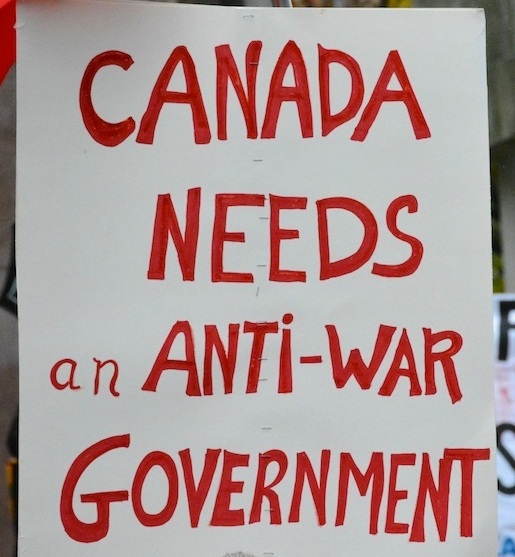 This exercise is
dangerous when one considers the plans to declare Martial Law in the
United States, as is evident in the response to the broad unrest
against the police killings of African-Americans, the deployment of
militarized police, federal and state National Guard troops totaling
more than 64,000 in the "war against coronavirus" now greatly increased
since June 1 in the "war against violent extremism," and the clashes
between the White House and state governors over control of the
machinery of state violence, and opposition from the military power to
interference by the executive power.
This exercise is
dangerous when one considers the plans to declare Martial Law in the
United States, as is evident in the response to the broad unrest
against the police killings of African-Americans, the deployment of
militarized police, federal and state National Guard troops totaling
more than 64,000 in the "war against coronavirus" now greatly increased
since June 1 in the "war against violent extremism," and the clashes
between the White House and state governors over control of the
machinery of state violence, and opposition from the military power to
interference by the executive power.
William Arkin, one of the top U.S. security analysts, stated in Newsweek on March 13 that on February 1, "U.S. Defense Secretary Mark T. Esper signed orders directing NORTHCOM to execute nationwide pandemic plans." He reported that "Secretly, he signed Warning Orders (the WARNORD as it's called) alerting NORTHCOM and a host of east coast units to 'prepare to deploy' in support of potential extraordinary missions." These missions are codified in a series of seven secret plans involving "continuity of government and protection of the presidency."
When could the military's "emergency authority" be needed? "Traditionally, it's thought of after a nuclear device goes off in an American city. But now, planners are looking at military response to urban violence as people seek protection and fight over food. And, according to one senior officer, in the contingency of the complete evacuation of Washington," Arkin reports. All these plans are the responsibility of U.S. NORTHCOM.
In addition, the provocative exercise coincides with the announcement by the Trump administration of U.S. withdrawal from the Treaty on Open Skies as part of its wrecking of post-war arrangements which no longer serve its interests. The treaty is an international arms control mechanism signed and ratified by 34 countries, most notably Russia and the USA, but also nearly all European NATO members. As usual, Washington blames Russia for its move and spreads disinformation about "Russian spying" on the United States, hence this exercise. Ottawa follows suit, to divert attention from the fact that the U.S., through NORAD/NORTHCOM, is pushing the world closer to the brink of nuclear war in which the Canadian Forces are to be deployed to defend the "homeland." Arlkin writes that justifications must "present catastrophic pressure great enough to justify movement into extra-Constitutional actions and extraordinary circumstances plans," which may conceivably be provided by alleged Russian bomber penetration or even Chinese missile attacks. Last year, Trump cited the danger of “invasions” across the U.S.-Mexican border eight times in one major speech to justify the deployment of almost 10,000 troops, raising the spectre of an invasion of Mexico itself.
The Treaty on open skies permits nations to conduct reconnaissance flights over each other's territories with the number of flights depending on the size of the respective country. The USA and Russia for example are each allowed to conduct 42 flights annually and Germany twelve. More than 1,500 observation flights have been conducted since 2002, of which around 500 were conducted over Russian and Belorussian territory by the USA (200) and other NATO countries (300), according to the German Institute for International and Security Affairs (SWP) in Berlin. Russia has only conducted 70 flights over U.S. territory, and many more over European NATO-member countries, which are of central importance for preparations for potential U.S.-NATO aggression.
(With files from Navy Times, U.S. Naval Institute of Proceedings, german-foreign-policy.com, Newsweek.)
Statements
Veterans For Peace
Veterans For Peace calls for the immediate withdrawal of the Minnesota National Guard. We are appalled to see military weapons, vehicles and equipment once again deployed in U.S. cities to control community members who are reacting to a long history of state-sanctioned violence. When an already embattled community is subjected to militarized intimidation, by design, their environment becomes a war zone. We call on all those who are serving with the National Guard to refuse to serve violent and racist interests.
Veterans For Peace denounces the ongoing instances of police violence against Black bodies and people of color, this time resulting in the killing of George Floyd in Minneapolis, Minnesota. We also stand in opposition to the State of Minnesota's and the Minneapolis police force's militarized response to the right to protest.
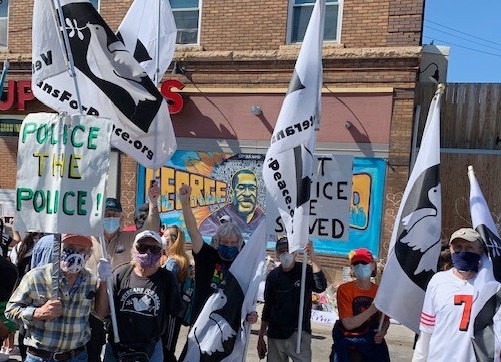 Learning nothing
from the now seemingly endless examples of ineffective attempts to
silence protests with militarized violence -- from Ferguson to
Baltimore to New Orleans to Standing Rock -- political figures continue
to call on more military to quell the powerful resistance seen from the
people in Minneapolis who demand justice. We continue to see the
escalation of threats of violence from those in power -- from Trump's
tweets threatening to shoot protestors to the governor's decision to
send in the National Guard.
Learning nothing
from the now seemingly endless examples of ineffective attempts to
silence protests with militarized violence -- from Ferguson to
Baltimore to New Orleans to Standing Rock -- political figures continue
to call on more military to quell the powerful resistance seen from the
people in Minneapolis who demand justice. We continue to see the
escalation of threats of violence from those in power -- from Trump's
tweets threatening to shoot protestors to the governor's decision to
send in the National Guard.
As Veterans For Peace, we know that increased militarization in our communities will never bring peace. We know that peace is only achieved with a strong commitment to justice. As veterans who served in various wars, we know there is a connection between increasing racist violence in the United States and the massive indiscriminate killing of hundreds of thousands of people in other lands. Growing racism against black, brown and Muslim people in the United States is a reflection of the racism that justifies killing non-white people abroad. The U.S. military deliberately uses racism to motivate young men and women to kill.
As veterans, we know what it's like to be called to a "duty" that goes against our conscience. We urge all current National Guard members to lay down their weapons and refuse to fight against their neighbours and fellow community members. We urge you all to be fully informed as you make profound choices with possibly serious consequences. We urge any troops facing possible deployment to Minneapolis or already there to contact the National Lawyers Guild Military Law Task Force at (619) 463-2369 and/or help@militarylawhelp.com for referral to a civilian attorney to discuss your options.
Our nation's consistent option for militarization and the use of deadly force when it is not needed -- at home and abroad -- is exactly why we find ourselves in this situation. It makes no sense to think more violence and trauma heaped upon the Minneapolis community will quell the unrest. The Governor has moved beyond using a militarized police force to using the military. He is relying on intimidation and fear to end this. The only thing that will quiet this storm is justice.
Pro-Independence Organizations in
Puerto Rico and Diaspora
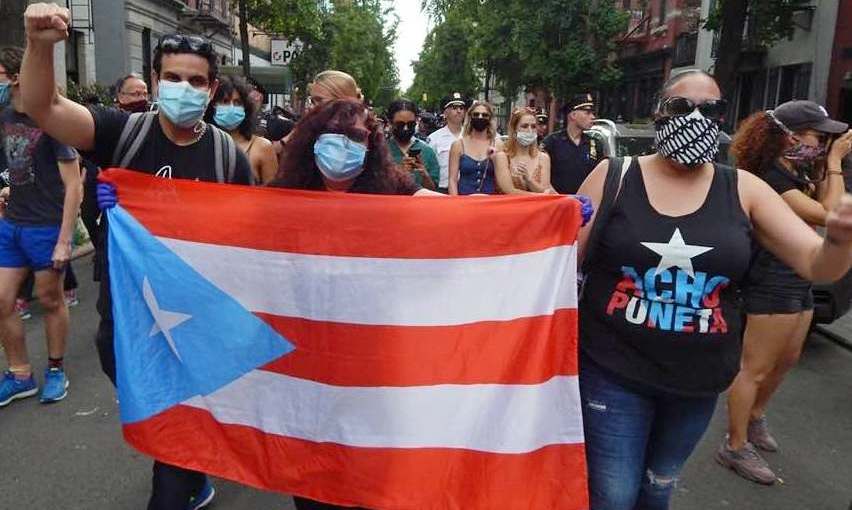
Puerto Rican contingent participates in May 31, 2020 action in New York
City protesting the killing of George Floyd.
The organizations of the National Liberation Movement of Puerto Rico, signatories to this communiqué, express our strongest support to black American communities that during the past few days have held strong protests on the streets of the United States, demanding justice for George Floyd. We also joined the call for arrest and immediate prosecution of the policemen who murdered him.
The murder of George Floyd, a young black American worker, in broad daylight and in front of the cameras adds another affront, a direct attack on African-American communities and all oppressed communities in that country. The police and far-right forces have been emboldened by the sectarian policies of the racist president and the forces of America's corporate-financial elite in power, who want to rewrite history by ripping off conquered rights, even if it means taking the American people back into a civil war.
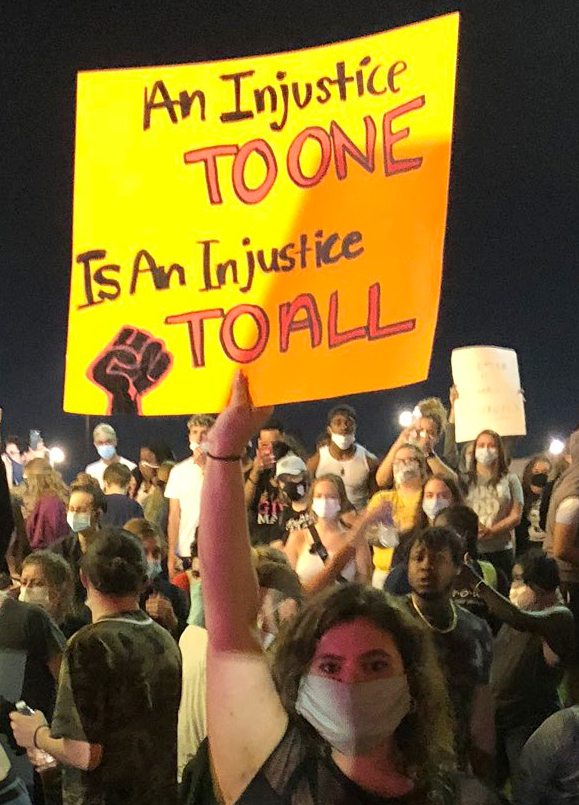 Puerto Ricans,
Latinos, Native Americans, and all oppressed communities, as an
important component of the working class that moves the country's
economy, suffer daily from the injustices of a system based on the
exploitation of work, and racial, ethnic and gender discrimination,
which, through oppression, seek to maintain the established order and
privileges of a parasitic social class in power.
Puerto Ricans,
Latinos, Native Americans, and all oppressed communities, as an
important component of the working class that moves the country's
economy, suffer daily from the injustices of a system based on the
exploitation of work, and racial, ethnic and gender discrimination,
which, through oppression, seek to maintain the established order and
privileges of a parasitic social class in power.
Our Puerto Rican communities (New York, Chicago, Newark, Connecticut, Florida) in exile in the U.S. and the Puerto Rican independence movement particularly know well the brutality of the state that persecutes and murders those who fight and resist oppression, discrimination, and exploitation. That's why we stand in solidarity with African-American communities across the United States that are on the front line of defence against the fascist, racist, and sexist state. It is clear their struggles, ultimately, are also ours. We affirm that an oppressed people are always given the right to self-defence by refusing to continue to be the daily target of repression and murder.
Historically, we have denounced and evidenced at every moment of social confrontation, the role of the police and the state's repressive forces in protecting the property and interests of the ruling political class, whose interests are antagonistic to the interests of the majorities of the people. Other repressive bodies such as the FBI, NSA, CIA and paramilitaries are trained as a tool to kill to achieve that end, waging war against all working communities.
In making our call, demanding justice for George Floyd and all those who have been victims of brutality and murder by the police and repressive forces, we remember that we are witnessing a sharpening of social class struggle, which deepens with the collapse of the capitalist model and its consequent rise in unemployment, lack of adequate medical services, extreme poverty, hunger and the expansion of misery.
It will take a radical change of the social contract to overcome the crisis. It is the hour of solidarity and the unity of the peoples.
For a list of the signatories, click here.
(May 30, 2020. Edited slightly for style and grammar.)
National Nurses United
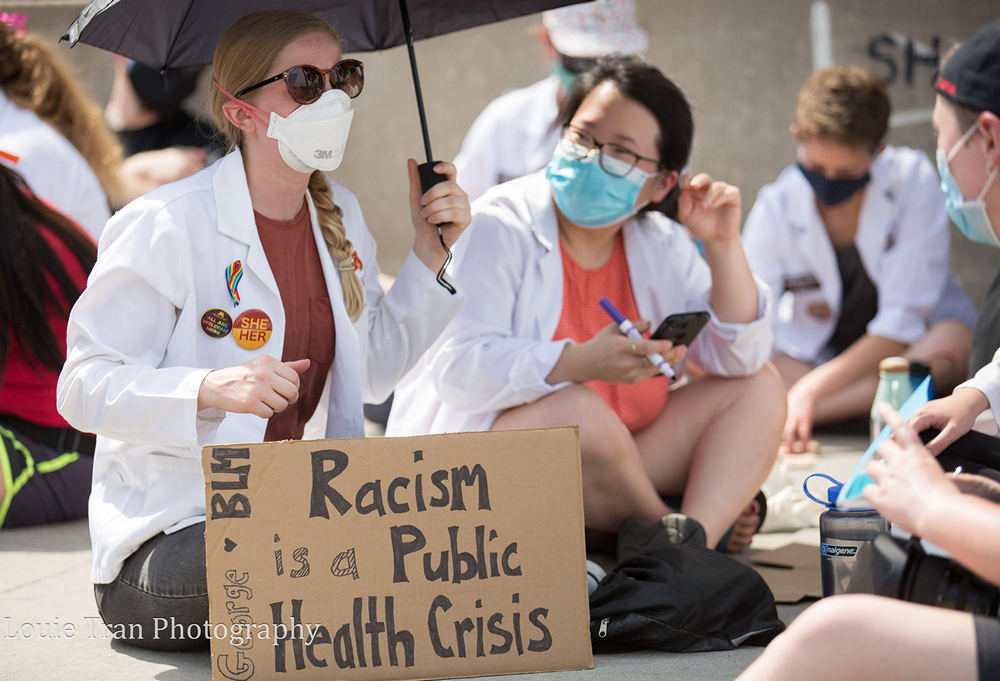
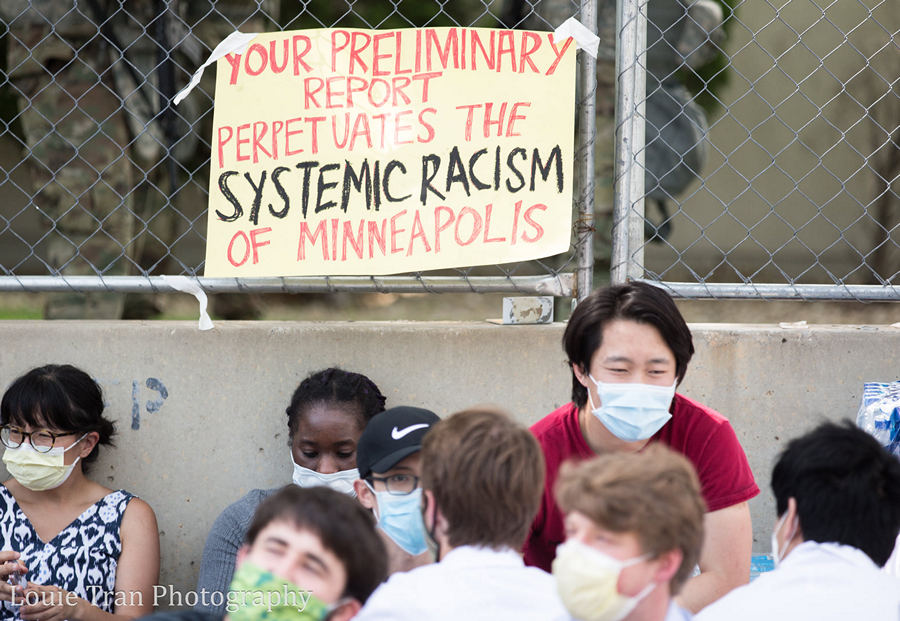
June 2, 2020 protest by medical students in Minneapolis, MN against the
Hennepin County Medical Examiner's misleading preliminary report on the
death of George Floyd.
Following a weekend of nationwide protests, National Nurses United (NNU) today [June 1] said the nation is long overdue in confronting the systemic racism that is at the heart of much of the current crisis and long overdue in dedicating itself to fundamental reforms.
"There's a common link between the latest wave of police and white supremacist killings of African Americans and the disproportionate racial impact of the pandemic and the economic crisis," said NNU Executive Director Bonnie Castillo, RN.
"Nurses understand that when you have pain and suffering, whether it is one patient or a community that is hurting, the first priority must be healing and recovery, driven by compassion and humanity," Castillo said. "We're seeing far too much of the opposite reaction."
Across the United States, African Americans and in many areas Latinos, have died of COVID-19 in numbers as high as three to four times the rate of whites, and have lost jobs in greater percentages since March. "Coupled with the murders of George Floyd, Breonna Taylor, and Ahmaud Arbery, there is a palpable outrage and frustration after years of inaction that has prompted the protests," said Castillo.
"Instead of addressing the persistent thread of racism, and working for transformative change to policing practices and the health, economic, and political crisis that harms African Americans and other communities of color in far greater numbers, they see inaction, evasion of responsibility, and outright blaming of those most harmed by these policies," said Castillo.
For example, the medical examiner in Minneapolis issued a report asserting it could find "no physical findings that support a diagnosis of traumatic asphyxia or strangulation" that caused the death of George Floyd, blaming instead underlying medical conditions including coronary artery disease and hypertensive heart disease.
"He didn't die of heart disease last Monday," Castillo said. "He died when he had a police officer heavily kneeling on his neck, for up to nine minutes while handcuffed and lying on his stomach imploring him to stop because 'I can't breathe.' He did not die due to pre-existing conditions, he died because of police misconduct."
"Pre-existing illness is a marketing tool developed by the insurance industry to deny health coverage, or charge exorbitant prices, for people who may be ill for many reasons that have nothing to do with their health practices, ranging from genetic conditions to environmental pollution to racial disparities in medical treatment."
"We all exist and need and deserve care throughout our lifetimes, which is the fundamental commitment of nurses, and pre-existing illness should never be used as a pretext for denying care or denying the actions of those who inflict harm, injury or other suffering. What really pre-exists is the legacy of racism."
The examiner's report resembled a recent statement by Health and Human Services Secretary Alex Azar who cited African American comorbidities such as obesity and diabetes for the drastically high black COVID-19 death rates, noted Castillo, calling it "a transparent attempt to cover up the disastrously failed response of the Trump Administration to the pandemic."
"In fact, it is racism that is the deadly disease, whether it is infusing police killings, the decades of racist disparities in health care, housing, employment, education, criminal justice, and so many other facets of our society that have boiled over in a call for change now in our streets," Castillo concluded. "This is an extremely perilous moment. We are at a crossroads in this nation. It is increasingly evident that verbal opposition to the policies in Washington and in many states, is not enough.
"We have to fundamentally challenge the systemic roots of this crisis, notably the systemic racism Trump's people not only deny but foment.
"And we must acknowledge that it is the economic, political, legal, and corporate system that reinforces this crisis. We must push for the transformative changes that will protect the health and safety of everyone, protect our diversity, and protect our democracy."
National Nurses United is the largest and fastest-growing union and professional association of registered nurses in the United States with more than 150,000 members nationwide.
(June 1, 2020)
American Civil Liberties Union
National Security Project
The American Civil Liberties Union (ACLU) was founded in 1920. Its National Security Project "advocates for national security policies consistent with the Constitution, the rule of law, and fundamental human rights," litigating cases relating to detention, torture, discrimination, surveillance, censorship, and secrecy.
Across the country, people are protesting police brutality and systemic racism. They are relentlessly demanding justice for George Floyd, Breonna Taylor, and the countless other Black people killed by police. In response, President Trump, supported by belligerent enablers in Congress and his administration, has threatened to deploy federal troops into states, and federal agencies are investigating protestors for domestic terrorism. These presidential threats and actions are authoritarian, irresponsible, dangerous, and wrong.
Trump's threat to invoke the Insurrection Act of 1807 was extraordinary -- over the last 50 years, presidents have rarely used this extreme authority, and rightly so. In this country, we have a strong norm against deploying the military on domestic soil, recognizing the threat it poses to liberty and individual civil rights. This norm is reflected in law -- Congress passed the Posse Comitatus Act in 1878 to prohibit the use of federal military forces "to execute the law" unless the Constitution or Congress authorize it. That means the federal military can't, for example, search, seize, arrest, apprehend, stop and frisk, surveil, pursue, interrogate, or investigate civilians.
![]() But Congress also passed
exceptions to the Posse Comitatus Act, the most
expansive and potentially dangerous of which is the Insurrection
Act of 1807. In the Insurrection Act,
Congress gave presidents the authority to deploy active-duty federal
troops and National Guard members under federal control -- to suppress
insurrection, acts of massive or widespread violence that "make it
impracticable" to enforce federal law, or similar violence that
obstructs federal law or the course of justice. Historically,
presidents have invoked this authority to deploy troops at the request
of a state, but also sometimes over a state's objections -- for
example, to enforce civil rights protections and court-ordered
desegregation. That is the opposite of what Trump would do.
But Congress also passed
exceptions to the Posse Comitatus Act, the most
expansive and potentially dangerous of which is the Insurrection
Act of 1807. In the Insurrection Act,
Congress gave presidents the authority to deploy active-duty federal
troops and National Guard members under federal control -- to suppress
insurrection, acts of massive or widespread violence that "make it
impracticable" to enforce federal law, or similar violence that
obstructs federal law or the course of justice. Historically,
presidents have invoked this authority to deploy troops at the request
of a state, but also sometimes over a state's objections -- for
example, to enforce civil rights protections and court-ordered
desegregation. That is the opposite of what Trump would do.
Much as Trump loves the rhetoric of "war" and sees Black and Brown protest as a threat, the reality is that we are not at war in this country. Nor is it impracticable for civilian authorities to respond calmly and responsibly to unrest, especially when it is over their own abuses. Protestors are demanding that law enforcement end decades of unjust, unequal, and racist treatment of Black communities.
What Trump doesn't seem to understand when he threatens to unleash "unlimited" military power domestically is that there are limits. Even if he were to wrongly and unnecessarily invoke the Insurrection Act, federal troops would still be subject to all of the safeguards and restrictions the Constitution imposes. Even so, the escalation would carry obvious dangers of excessive government surveillance and use of force, in violation of the Constitution. Civilian police, National Guard forces in DC, and some National Guard forces in states are already engaging in serious abuses and violence.
An even more militarized response to civilian dissent would escalate the tension, fear, and pain we're seeing and feeling across the country, especially in communities already traumatized by police violence. It would worsen the over-policing of Black lives -- the very reason why people around the country are protesting.
Current and former military leaders are rightly warning against calling out more troops, and reminding troops of the fundamentals of the Constitution. Still, the fact that military leaders are being hailed as calming influences is a stark marker of how broken our politics, norms, and country are. It was not so long ago that military leaders had to reaffirm the prohibition against torture when it was systematically used against Brown and Black men abroad.
We have not come a long way, America. Perhaps policymakers will finally wake up to the harms of decades of rights-violating, war-based foreign policy -- and its connections to militarized policing and racism at home. Every politician who is quick to laud Dr. Martin Luther King Jr. needs to remember his radical call to action against "the giant triplets of racism, extreme materialism, and militarism." There is so much to fundamentally reform, and the people in the streets are demonstrating their urgent will for change. Yet much like during Dr. King's time, federal agencies are viewing civil rights protests and protestors as domestic terrorists -- enemies of the state.
Public attention has mostly focused on Trump blaming Antifa for violence and asserting that he would designate it as a domestic terrorist organization, even though he does not have that legal authority. That the same day, the FBI's Washington Field Office reported it "has no intelligence indicating Antifa involvement/presence" in violence, and a later Department of Homeland Security intelligence assessment reportedly found the violence that has occurred is opportunistic.
Focusing on the threat against Antifa alone, though, misses the broader harms and consequences. Attorney General Barr this week enthusiastically announced that the Justice Department is using its broad and abusive domestic terrorism investigative powers in response to civil unrest.
Terrorism is an inherently political label, easily abused and misused. Communities of color already know this from 20 years of experience being targeted for discriminatory surveillance and investigation under the Patriot Act's broad and vague definition of domestic terrorism. Black communities have long been in federal law enforcement's cross-hairs: in 2017, the FBI concocted the label "black identity extremists," opening the door to bias-based profiling of Black people and Black-led organizations who use their voices to demand racial justice. The agency appears to have conducted similar investigations of indigenous activists and protest. Civil rights leaders and groups have long demanded reform of national security and criminal authorities that discriminatorily suppress and punish Black and Brown people, and raise significant equal protection, due process, and First Amendment concerns. But Congress has stubbornly refused to act.
Now, Trump and Barr appear willing to bring the massive weight of the federal government's expanded post-9/11 investigative powers and agencies down on new generations of racial justice and civil rights activists crying out for the right of Black people to live, and a more equal and just America.
These are some of the real threats we face right now -- and reject.
(June 4, 2020)
Joint Statement by the National Association for
the Advancement of Colored People and
Women Professionals
The National Association for the Advancement of Colored People (NAACP), the oldest and largest nonpartisan civil rights organization in the U.S. was formed in 1909 to advance justice for African Americans. The Links Inc. is a volunteer service organization of more than 16,000 Afro-American women professionals committed to ensuring the culture and economic survival of African Americans and other persons of African ancestry.
The NAACP and The Links, Incorporated are releasing a joint statement to express their strong support of the collective outrage and calls for policing reform expressed by residents all over the country in response to the murder of George Floyd by Minneapolis police officers and the recent killings of Ahmaud Arbery, Breonna Taylor, and others at the hands of current or former law enforcement officers. The nationwide protests represent the anger, pain, fear, and distrust directed toward law enforcement resulting from decades of brutality against African Americans.
For too long, law enforcement and the criminal justice system at large has racially profiled, arrested, convicted, and sentenced African Americans more harshly than the rest of America. As George Floyd's killing tragically demonstrates, any interaction between an African American and law enforcement can instantaneously become deadly. We will not rest until all the officers involved in these incidents are arrested, charged and convicted. We must ensure that justice is served in each and every case.
The nation's collective condemnation of police violence against the Black community represents a watershed moment. This is the time for systemic changes to policing in this country. We need federal, state, and local reforms which impose strict police accountability, limit the use of force, eliminate racial profiling, de-militarize law enforcement, track and report data, and ensure proper screening, education and training of all officers. Local law enforcement agencies receive federal funding and must be made to comply with federal civil rights laws.
 Derrick Johnson, President and
CEO of the NAACP: "Enough is enough. The entire country has reached its
limit in terms of deadly police practices. We cannot allow one more
Black person to die at the hands of government. Our #WeAreDoneDying
campaign is aimed at eliminating racial disparities that are harming
our communities and taking our lives. Nowhere is there more systemic
injustice than in law enforcement's treatment of the Black community it
is charged with guarding and protecting. We must seize this moment to
eliminate racism from policing and to hold every officer accountable
for his or her actions."
Derrick Johnson, President and
CEO of the NAACP: "Enough is enough. The entire country has reached its
limit in terms of deadly police practices. We cannot allow one more
Black person to die at the hands of government. Our #WeAreDoneDying
campaign is aimed at eliminating racial disparities that are harming
our communities and taking our lives. Nowhere is there more systemic
injustice than in law enforcement's treatment of the Black community it
is charged with guarding and protecting. We must seize this moment to
eliminate racism from policing and to hold every officer accountable
for his or her actions."
Kimberly Jeffries Leonard, Ph.D., National President, The Links, Incorporated: "Our community has reached its breaking point. We cannot take one more death based on race, one more unjust sentence or one more denial of our civil and human rights. The time to speak is now. We must let those in power know that daily rights -- jogging, buying personal items, or just sleeping in our home -- should not end in a death sentence for Black people. The Links, Incorporated and our 16,000+ members are committed to ensuring the survival of our communities of African descent and the change necessary to do so. We stand with the NAACP's call for the United Nations to classify the mistreatment of Black people in the United States by the police a human rights violation. We call for incident oversight by review boards and human rights commissions and the use of body cameras for all officers. We can no longer delay action. Our collective voice can make a difference. Enough is truly enough. #LinksCallToJustice."
(June 2, 2020)
Council on America-Islamic Relations-San Francisco Bay Area and Advancing Justice-Asian Law Caucus
The Council on American-Islamic Relations is the largest U.S. Muslim civil liberties and advocacy organization. The Asian Americans Advancing Justice-Asian Law Caucus was founded in 1972 as the nation's first legal and civil rights Asian American organization with a specific focus on addressing the needs of low-income, immigrant and underserved Asian Americans and Pacific Islanders.
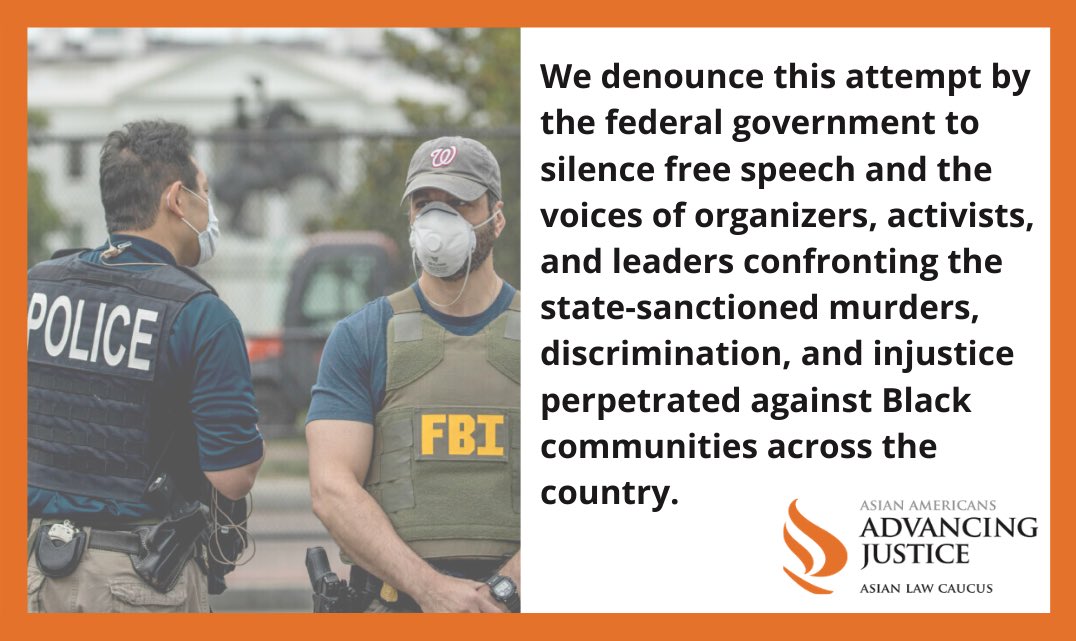 The San
Francisco Bay Area office of the Council on American-Islamic Relations
(CAIR-SFBA) and Advancing Justice-Asian Law Caucus (ALC) today denounce
the use of terrorism laws to target protesters and silence speech.
The San
Francisco Bay Area office of the Council on American-Islamic Relations
(CAIR-SFBA) and Advancing Justice-Asian Law Caucus (ALC) today denounce
the use of terrorism laws to target protesters and silence speech.
The U.S. Department of Justice (DOJ) announced last Friday, May 31, that the federal government is coordinating with state and local law enforcement through the Federal Bureau of Investigation's (FBI) Joint Terrorism Task Force (JTTF), to investigate "Antifa and other similar groups" and bring charges against individuals under domestic terrorism laws. By naming Antifa, which has neither a centralized structure nor any identifiable membership, federal and local law enforcement have indicated their intention to broadly target individuals engaging in protests, dissent, and demands for justice.
In response, the two offices issue the following joint statement:
"We denounce this attempt by the federal government to silence free speech and the voices of organizers, activists, and leaders confronting the state-sanctioned murders, discrimination, and injustice perpetrated against Black communities across the country.
"The FBI has a long history of targeting Black activists and framing political dissent and opposition as terrorism. From the now-discredited COINTELPRO program to the surveillance of Black Lives Matter activists, the FBI has routinely used its power to surveil, infiltrate, discredit, and disrupt civil dissent. However, this large-scale and overt threat to prosecute protesters using the JTTFs and terrorism laws is new and dangerous. To use the bogeyman of terrorism to suppress freedom of speech and the freedom to protest and voice grievances is the hallmark of fascist regimes.
"We stand with Black communities in resistance and demand that the DOJ retract its position, and instead use its resources to purge the scourge of white supremacy from law enforcement agencies across the country."
(June 3, 2020)
COVID-19 Update
U.S. President Piles on More Provocations to
an Already Disgraceful Situation
U.S. President Donald Trump held a press conference on June 5, where he stated that the COVID-19 pandemic has been largely overcome and is under control in the U.S. He declared that the country has been pacified through the use of the National Guard and their domination of the streets against looting. He declared that the United States is on its way to a great economic recovery and renewed dominance in world affairs.
Domination of the streets and in world affairs were a recurrent theme at the press conference. The claim that the pandemic is largely a thing of the past was graphically illustrated through the violation of social distancing of reporters' chairs at the press conference. According to the media, the chairs had initially been positioned consistent with social distancing guidelines, but were moved closer together by White House staff shortly before the event began. "Even you, I notice you're starting to get much closer together, looks much better, not all the way there yet, but you'll be there soon," Trump remarked to reporters.
The press conference had been triggered by a Department of Labor report released that day that claimed that the unemployment rate had dropped to 13.3 per cent in May, compared with 14.7 per cent in April and that 2.509 million jobs had been gained, following a record plunge of 20.687 million in April. Combined with the surge in stock markets, Trump referred to this as the "greatest comeback in American history."
"This is a great day for everybody in terms of equality," he said.
The press conference appeared to be a wild and desperate act in to dominate the faction of the ruling imperialist elite Trump represents. This includes electoral dominance -- the U.S. presidential election is scheduled to take place in November -- over its rivals and the American people who have been persistently protesting racial injustice and state violence and impunity since the killing of George Floyd by the Minneapolis police on May 25. Similar actions by the world's peoples have been taking place in a large number of countries.
Trump created a lot of anger amongst the American people and the peoples of the world when he dared to claim that George Floyd would be happy with the job numbers and the so-called pacification of the streets through brutal force, including through the use of the National Guard.
"Hopefully George is looking down right now and saying 'this is a great thing that's happening for our country,'" Trump said in a most vulgar and provocative way. "This is a great day for him. It's a great day for everybody. "
Provocation and desperation filled the air as the U.S. President expressed the willingness of the ruling imperialist faction in power in the U.S. to further sacrifice peoples' lives with no-holds-barred de-confinement, claiming that the " economy" supersedes any other consideration as the source of U.S. imperialist power at home and abroad. He had no words of remorse or even regret for the 107,000 people in the U.S. who have died so far of COVID-19. In fact, he presented these deaths as a victory. Millions, he said, could have died, had the U.S. had not closed its borders to China, and to the peoples of the countries of the European Union and others who were infected by what he referred to as "the plague," a "gift from China." He said that employment figures will greatly improve once all U.S. States agree to end confinement and the "economy" is allowed to develop, uncontrolled and unchecked, with the lifting of measures to stop the spread of COVID-19.
This is the wild card this ruling imperialist faction is playing at the expense of the health and safety and the dignity and rights of the people in the U.S. and the peoples of the world. It is fraught with danger, including the risk of a full-fledged civil war between the factions of the elite. This highlights the necessity for the peoples of the U.S. and of the world to develop their own independent politics for their own empowerment, while stepping up the fight for their rights, including against racial injustice, state violence and impunity.
Significant Impacts to Health Services for Noncommunicable Diseases
Prevention and treatment services for noncommunicable diseases (NCDs) have been severely disrupted since the COVID-19 pandemic began, according to a WHO survey released today [June 1]. The survey, which was completed by 155 countries during a 3-week period in May, confirmed that the impact is global, but that low-income countries are most affected.
This situation is of significant concern because people living with NCDs are at higher risk of severe COVID-19-related illness and death.
"The results of this survey confirm what we have been hearing from countries for a number of weeks now," said Dr Tedros Adhanom Ghebreyesus, Director-General of the World Health Organization. "Many people who need treatment for diseases like cancer, cardiovascular disease and diabetes have not been receiving the health services and medicines they need since the COVID-19 pandemic began. It's vital that countries find innovative ways to ensure that essential services for NCDs continue, even as they fight COVID-19."
Service Disruptions Are Widespread
The main finding is that health services have been partially or completely disrupted in many countries. More than half (53 per cent) of the countries surveyed have partially or completely disrupted services for hypertension treatment; 49 per cent for treatment for diabetes and diabetes-related complications; 42 per cent for cancer treatment, and 31 per cent for cardiovascular emergencies.
Rehabilitation services have been disrupted in almost two-thirds (63 per cent) of countries, even though rehabilitation is key to a healthy recovery following severe illness from COVID-19.
Reassignment of Staff and
Postponing of Screening
The postponement of public screening programmes (for example for breast and cervical cancer) was also widespread, reported by more than 50 per cent of countries. This was consistent with initial WHO recommendations to minimize non-urgent facility-based care whilst tackling the pandemic.
But the most common reasons for discontinuing or reducing services were cancellations of planned treatments, a decrease in public transport available and a lack of staff because health workers had been reassigned to support COVID19 services. In one in five countries (20 per cent) reporting disruptions, one of the main reasons for discontinuing services was a shortage of medicines, diagnostics and other technologies.
Unsurprisingly, there appears to be a correlation between levels of disruption to services for treating NCDs and the evolution of the COVID-19 outbreak in a country. Services become increasingly disrupted as a country moves from sporadic cases to community transmission of the coronavirus.
Globally, two-thirds of countries reported that they had included NCD services in their national COVID-19 preparedness and response plans; 72 per cent of high-income countries reported inclusion compared to 42 per cent of low-income countries. Services to address cardiovascular disease, cancer, diabetes and chronic respiratory disease were the most frequently included. Dental services, rehabilitation and tobacco cessation activities were not as widely included in response plans according to country reports.
Seventeen per cent of countries reporting have started to allocate additional funding from the government budget to include the provision of NCD services in their national COVID-19 plan.
Alternative Strategies for Continuing Care Being Implemented
Encouraging findings of the survey were that alternative strategies have been established in most countries to support the people at highest risk to continue receiving treatment for NCDs. Among the countries reporting service disruptions, globally 58 per cent of countries are now using telemedicine (advice by telephone or online means) to replace in-person consultations; in low-income countries this figure is 42 per cent. Triaging to determine priorities has also been widely used, in two-thirds of countries reporting.
Also encouraging is that more than 70 per cent of countries reported collecting data on the number of COVID-19 patients who also have an NCD.
"It will be some time before we know the full extent of the impact of disruptions to health care during COVID-19 on people with noncommunicable diseases," said Dr Bente Mikkelsen, Director of the Department of Noncommunicable Diseases at WHO. "What we know now, however, is that not only are people with NCDs more vulnerable to becoming seriously ill with the virus, but many are unable to access the treatment they need to manage their illnesses. It is very important not only that care for people living with NCDs is included in national response and preparedness plans for COVID-19 -- but that innovative ways are found to implement those plans. We must be ready to "build back better" strengthening health services so that they are better equipped to prevent, diagnose and provide care for NCDs in the future, in any circumstances."
Note
Noncommunicable diseases kill 41 million people each year, equivalent to 71 per cent of all deaths globally. Each year, 15 million people die from an NCD between the ages of 30 and 69 years; more than 85 per cent of these "premature" deaths occur in low and middle-income countries.
(June 1, 2020)
On the Global Pandemic for Week Ending June 6
Number of Cases Worldwide
As of June 6, the worldwide statistics for COVID-19 pandemic as reported by Worldometer were:
- Total reported cases: 6,869,085. This is 816,824 more than the total reported on May 30 of 6,052,261. This compares to the increase in cases in the previous week of 731,427.
- Total active cases: 3,106,916. This is 97,238 more than the number reported on May 30 of 3,009,678. This compares to an increase in the previous week of 198,384.
- Closed cases: 3,762,169. This is 719,586 more than the number reported on May 30 of 3,042,583. This compares to an increase in the previous week of 529,552.
- Deaths: 398,586. This is 31,299 more deaths than on May 30, when the toll was 367,287. This compares to an increase in the previous week of 27,026.
- Recovered: 3,363,583. This is up 688,287 from the May 30 figure of 2,675,296 and compares to an increase the previous week of 502,589 recoveries.
There were 130,529 new cases on June 5, a new all-time high number, exceeding the previous high mark of 129,663 reached the day before. The number of new daily cases ranged between 104,576 to 130,529 over the past week.
The disease was present in 213 countries and territories, the same as the week prior. Of these, 42 countries had less than 100 cases, as compared to May 23 when there were 48 countries with less than 100 cases. There are 21 countries/territories without active cases this week, the same number as the previous week. They are the Isle of Man (336 cases; 312 recovered; 24 deaths); Montenegro (324 cases; 315 recovered; 9 deaths); Faeroe Islands (187 cases, all recovered); Aruba (101 cases; 98 recovered; 3 deaths); French Polynesia (60 cases, all recovered); Macao (45 cases; all recovered); Eritrea (39 cases, all recovered); Timor-Leste (24 cases, all recovered); Fiji (18 cases, all recovered); Saint Kitts and Nevis (15 cases, all recovered); Greenland (13 cases, all recovered); the Malvinas (13 cases, all recovered); the Turks and Caicos (12 cases; 11 recovered; 1 death); the Seychelles (11 cases, all recovered); Montserrat (11 cases, 10 recovered; 1 death); Papua New Guinea (8 cases; all recovered); British Virgin Islands (8 cases; 7 recovered; 1 death); Caribbean Netherlands (7 cases; all recovered); St. Barth (6 cases, all recovered); Anguilla (3 cases, all recovered); Saint Pierre et Miquelon (1 case, recovered).
The five countries with the highest number of cases on May 30 are noted below, accompanied by the number of cases and deaths per million population:
USA: 1,965,912 (1,115,789
active; 738,729 recovered; 111,394 deaths) and 5,942 cases per million;
337 deaths per million
- May 30: 1,793,530 (1,169,419 active; 519,569 recovered; 104,542
deaths) and 5,421 cases per million; 316 deaths per million
Brazil: 646,006 (308,875
active; 302,084 recovered; 35,047 deaths) and 3,041 cases per million;
165 deaths per million
- May 30: 468,338 (247,213 active; 193,181 recovered; 27,944 deaths)
and 2,205 cases per million; 132 deaths per million
Russia: 458,689 (231,576
active; 221,388 recovered; 5,725 deaths) and 3,143 cases per million;
39 deaths per million
- May 30: 396,575 (224,551 active; 167,469 recovered; 4,555 deaths) and
2,718 cases per million; 31 deaths per million
Spain: 288,058 (active and
recovered N/A; 27,134 deaths) and 6,161 cases per million; 580 deaths
per million
- May 30: 285,644 (61,565 active; 196,958 recovered; 27,121 deaths) and
6,110 cases per million; 580 deaths per million
UK: 283,311 (active and
recovered N/A; 40,261 deaths) and 4,175 cases per million; 593 deaths
per million
- May 30: 271,222 (active and recovered N/A; 38,161 deaths) and 3,997
cases per million; 562 deaths per million
Looking at the countries with the highest number of daily new cases over the past week, in Brazil, the number of daily new cases, daily deaths and total active cases continue to increase. Over the past week, the number of new daily cases ranged from 14,556 to an all-time high of 31,890, In the U.S., the number of daily new cases fluctuated between 20,724 and 25,393, similar to the week before. India's number of daily new cases is rising and has surpassed that of Russia, ranging between 7,761 and 9,889 over the past week. In Russia, daily new cases ranged 8,536 to 9,268 over the past week, similar to the week before. Looking at the other countries with the highest daily new cases on June 5, they are in decreasing order: Mexico, 4,442; Chile: 4,207; Peru, 4,202; 3,377; Pakistan, 3,985; Iran, 2,886; and Bangladesh, 2,828. Of these countries, Brazil, India, Mexico, Pakistan and Bangladesh have increasing numbers of daily new cases and daily deaths. Iran's daily new cases are increasing, although the daily new deaths have yet to rise accordingly. The number of daily new cases in Chile and Peru appear to have peaked in the course of the past week.
Cases in Top Five Countries by Region
In Europe on June 6, the three other European countries with the highest number of reported cases after Spain and the UK, listed above, are Italy, France and Germany:
Italy: 234,531 (36,976 active;
163,781 recovered; 33,774 deaths) and 3,879 cases per million; 559
deaths per million
- May 30: 232,248 (46,175 active; 152,844 recovered; 33,229 deaths) and
3,841 cases per million; 550 deaths per million
Germany: 185,414 (7,751 active;
168,900 recovered; 8,763 deaths) and 2,213 cases per million; 105
deaths per million
- May 30: 183,019 (9,525 active; 164,900 recovered; 8,594 deaths) and
2,185 cases per million; 103 deaths per million
France: 153,055 (53,440 active;
70,504 recovered; 29,111 deaths) and 2,345 cases per million; 446
deaths per million
- May 30: 186,835 (90,318 active; 67,803 recovered; 28,714 deaths) and
2,863 ; 440 deaths per million
Senior public health officials in the UK have accused the government of lifting coronavirus restrictions too quickly. The Association of Directors of Public Health said ministers were "misjudging" the decision on easing the lockdown at a "critical moment," the Independent reported on June 1. The organization also questioned whether the relaxation of the rules and guidance was supported by science. The children's commissioner has called for summer schools to be set up to help pupils catch up on the work they have missed. Anne Longfield said the most vulnerable children were at risk of falling behind as a result of spending up to six months at home.
Also in the UK, the Office for National Statistics, reporting on pandemic figures for the week ending May 22, said on June 2 that 12,288 deaths were registered that week in England and Wales, 24 per cent more than normal for a week in mid-May. When data for Scotland and Northern Ireland are included, it means 61,920 more people than normal have died across the UK in this period. This puts the number of deaths per million at 929, which is among the highest rates worldwide.
The Guardian reported on June 4 that a test-and-trace system to be implemented by Britain's National Health Service (NHS), ostensibly aimed at preventing a second wave of the pandemic, is not expected to be fully operational until September or October. The Guardian's report states:
"Tony Prestedge, the chief operating officer of the NHS scheme, admitted in a webinar to staff that the programme would be 'imperfect' at launch, adding that he hoped it would be operational at a world-class level within three to four months.
"It comes as a leaked email from the chief executive of Serco -- one of the main companies contracted to deliver the service -- revealed how he doubted the scheme would evolve smoothly but said he wanted it to 'cement the position of the private sector' in the NHS supply chain.
"The disclosures come as scientists said lockdown measures should not be eased until the test-and-trace service is well established. The system, which tracks those who have contracted coronavirus and anyone they have been in contact with, before asking them to self-isolate, was rolled out across England last week with the help of 25,000 contact tracers."
In France, the economy is expected to shrink a record 11 per cent this year because of the pandemic, which is worse than the government's previous forecast of an 8 per cent contraction, Finance Minister Bruno Le Maire said on June 2. The government has progressively revised upwards the damage caused by the pandemic and the latest estimate will be included in a recovery budget that will be submitted to ministers on June 10.
France began removing lock-down restrictions on May 11. Some 300,000 cafés, bars and restaurants were allowed to reopen for regular business on June 2 but in Paris they remain limited to outside seating only. Le Maire said that businesses would continue to benefit from a government solidarity fund until the end of the year to help cover fixed costs. The government is trying to avert a string of retail bankruptcies by seeking buyers for big clothing chains Camaieu, Conforama and La Halle, which employ thousands of people, Le Maire said.
Minister Le Maire had previously announced sector-specific support plans for the tourism and car industries earlier this month. He said measures for the aerospace industry were being prepared for next week and the start-up and building sectors would follow afterwards.
Le Maire also announced that traditional mid-year sales by retailers would be pushed back to July 15 instead of June 24. He said the delay had been requested by small-business owners who needed more time to prepare after being closed for more than two months.
French automaker Renault announced on May 29 that it plans to cut 15,000 jobs worldwide "as part of a $2.2 billion cost-cutting plan to cope with reduced sales over the next three years," news agencies report. Under the plan, some 4,600 of those jobs would go in France, where 48,500 of its overall workforce of 180,000 employees are based. The cuts would affect just under 10 per cent of Renault's workforce. The company also plans to slash its annual production to 3.3 million vehicles, down from its current figure of 4 million.
In related news, Renault struck a deal with Japanese car-maker Nissan, with whom it has a strategic partnership, that will see the Renault take the lead in Europe "as the whole auto industry grapples with expensive shifts in electromobility and autonomous driving systems, as well as the impact of the pandemic," Politico reports. Nissan also announced the closure of its factory in Barcelona. The factory dates back to 1920 but has only been owned by Nissan since 1980. Nissan has already cut 600 jobs from its Barcelona operation "to reduce costs." In its announcement, Nissan said it will now redirect its resources toward Japan, China and the United States, "giving ground to Renault in continental Europe."
The production of vans will be shifted from Barcelona to Renault's French factories. About 3,000 direct jobs and between 25,000 and 30,000 indirect jobs depend on Barcelona's Zona Franca (free trade zone) factory. Spain and Catalonia had offered an injection of up to 100 million euros -- about a third of what Nissan needed to invest to build a new electric vehicle at the Barcelona factory, which would ensure its long-term viability, Politico writes. It adds: "The government argues that closing the factory would cost the company more than 1 billion euros in compensation to workers and suppliers, as well as the repayment of 25 million euros in taxpayer money handed to Nissan over the last 12 years. Madrid says that it would be cheaper for Nissan to invest and save the site. The government also warned that leaving Barcelona and Spain equals 'abandoning the European Union, with the consequent reputational damage in a market of more than 500 million people.'
"Nissan's decision does not directly affect the future of the company's other sites in northern Spain, including Ávila, where it produces spare parts, and Cantabria, where it manufactures electric vans."
In Eurasia on June 6, Russia tops the list of five countries with the highest cases in the region, with the figures reported above, followed by:
Turkey: 168,340 (30,292 active;
133,400 recovered; 4,648 deaths) and 1,998 cases per million; 55 deaths
per million
- May 30: 162,120 (31,668 active; 125,963 recovered; 4,489 deaths) and
1,924 cases per million; 53 deaths per million
Kazakhstan: 12,511 (5,556
active; 6,903 recovered; 52 deaths) and 667 cases per million; 3 deaths
per million
- May 30: 10,382 (5,288 active; 5,057 recovered; 37 deaths) and 554
cases per million; 2 deaths per million
Armenia: 12,364 (8,454 active;
3,720 recovered; 190 deaths) and 4,173 cases per million; 64 deaths per
million
- May 30: 8,927 (5,483 active; 3,317 recovered; 127 deaths) and 3,013
cases per million; 43 deaths per million
Azerbaijan: 6,860 (2,907
active; 3,871 recovered; 82 deaths) and 677 cases per million; 8 deaths
per million
- May 30: 4,989 (1,806 active; 3,125 recovered; 58 deaths) and 492
cases per million; 6 deaths per million
In West Asia on June 6:
Iran: 167,156 (29,281 active;
129,741 recovered; 8,134 deaths) and 1,992 cases per million; 97 deaths
per million
- May 30: 148,950 (24,389 active; 116,827 recovered; 7,734 deaths) and
1,775 cases per million; 92 deaths per million
Saudi Arabia: 95,748 (24,490
active; 70,616 recovered; 642 deaths) and 2,753 cases per million; 18
deaths per million
- May 30: 81,766 (24,295 active; 57,013 recovered; 458 deaths) and
2,352 cases per million; 13 deaths per million
Qatar: 65,495 (24,511 active;
40,935 recovered; 49 deaths) and 23,326 cases per million; 17 deaths
per million
- May 30: 52,907 (32,267 active; 20,604 recovered; 36 deaths) and
18,393 cases per million; 13 deaths per million
UAE: 37,642 (17,031 active;
20,337 recovered; 274 ) and 3,809 cases per million; 28 deaths per
million
- May 30: 33,170 (15,813 active; 17,097 recovered; 260 deaths) and
3,357 cases per million; 26 deaths per million
Kuwait: 30,644 (12,123 active;
18,277 recovered; 244 deaths) and 7,183 cases per million; 57 deaths
per million
- May 30: 25,184 (15,717 active; 9,273 recovered; 194 deaths) and 5,905
cases per million; 45 deaths per million
In Iran, a second surge of COVID-19 infections continues. On June 4, the country recorded the highest number of new daily cases, with 3,574, as part of three consecutive days of more than 3,000 new daily cases. The previous high mark dates back to March 30, when it recorded 3,186 new daily cases. Nonetheless, after two months of restrictions, mosques, churches, ports, business activities, restaurants and cafes will be allowed to re-open from June 7, Al Jazeera reports. Xinhua reports that the key border crossing between Iran and Turkey in Bazargan in northwestern Iran has reopened for trade after a three-month closure due to the pandemic.
Health Ministry spokesman Kianush Jahanpur said on June 3 in an interview with Iranian state TV news that "More serious compliance with physical distancing and more serious and smarter use of masks is an absolute necessity in the days ahead." Nine of Iran's 31 provinces are now considered "red zones" or carry a virus alert warning, Jahanpur said.
In Yemen, the United Nations warned that the COVID-19 pandemic could cause more deaths, disease and famine than the war being waged on it by the Saudi Arabia-led coalition over the last five years.
"There is a high probability that a pandemic resurgence will occur very soon in the country," UN Office for the Coordination of Humanitarian Affairs Chief Lise Grande warned on June 5. The alert came shortly after the organization announced a cut in financial aid to Yemen. "Of the U.S.$2.42 billion the UN has requested from its donors [to aid Yemen], only U.S.$1.35 billion will be received," Grande said.
"Yemen is experiencing the world's worst crisis, with 24 million people depending on humanitarian aid to stay alive," UN Secretary-General António Guterres said.
At least 180 out of 369 hospitals in Yemen will close within three weeks due to a lack of economic resources, news agencies report. Meanwhile, water and sanitation services for 8.5 million people, including 3 million children, will be disrupted.
As of June 6, Yemen has reported 469 cases (335 active; 23 recovered; 111 deaths) but given the situation of its health care system, it is suspected the disease is spreading widely without being detected.
On May 28, the European Union renewed its inhuman sanctions against Syria for another year despite the pandemic. The sanctions were first initiated in 2011 as part of the imperialists' efforts at regime change, that also included arming terrorist groups to foment civil war, at a terrible cost to the Syrian people. The sanctions ban oil imports and certain investments and technology transfers. As recent statements from the governments of Russia, Iran and Yemen point out, the sanctions interfere with the ability of the Syrian government to provide health care for the people in the midst of the COVID-19 pandemic, and must be lifted immediately. As of June 6, Syria has reported 124 cases (65 active; 53 recovered; 6 deaths).
In South Asia on June 6:
India: 237,566 (116,843 active;
114,073 recovered; 6,650 deaths) and 172 cases per million; 5 deaths
per million
- May 30: 174,301 (86,589 active; 82,731 recovered; 4,981 deaths) and
126 cases per million; 4 deaths per million
Pakistan: 93,983 (59,467
active; 32,581 recovered; 1,935 deaths) and 426 cases per million; 9
deaths per million
- May 30: 66,457 (40,931 active; 24,131 recovered; 1,395 deaths) and
301 cases per million; 6 deaths per million
Bangladesh: 63,026 (48,855
active; 13,325 recovered; 846 deaths) and 383 cases per million; 5
deaths per million
- May 30: 44,608 (34,623 ; 9,375 recovered; 610 deaths) and 271 cases
per million; 4 deaths per million
Afghanistan: 19,551 (17,411
active; 1,820 recovered; 320 deaths) and 503 cases per million; 8
deaths per million
- May 30: 14,525 (12,973 active; 1,303 recovered; 249 deaths) and 374
cases per million; 6 deaths per million
Sri Lanka: 1,801 (899 active;
891 recovered; 11 deaths) and 84 cases per million; 0.5 deaths per
million
- May 30: 1,559 (768 active; 781 recovered; 10 deaths) and 73 cases per
million; 0.5 deaths per million
Time magazine reported on June 1 about the situation in Mumbai, India, which it says is the "epicenter of India's worsening coronavirus outbreak, [and where the health care system] is overwhelmed as COVID-19 patients pour in and hospital staff work around the clock. Medical care for non-coronavirus patients has basically been shut off due to a lack of resources.
"'We are opening new wards daily but they get filled by end of day with COVID-19 patients. It is pretty bad right now,' said Saad Ahmed, a resident doctor at state-run King Edward Memorial Hospital in central Mumbai. 'All wards are now COVID-19 wards and they are full to the capacity.'
"Despite a strict two-month-long lockdown, the outbreak in India's financial capital has snowballed, with the city now accounting for more than a fifth of India's over 5,400 deaths and 190,600 infections. The pandemic's center is shifting away from New York and Europe to nations like Brazil and India, where under-funded health care infrastructure and poor living conditions provide fertile ground for the virus. India's virus death toll overtook China's on Thursday [May 28].
"A Twitter video in early May showed corpses of virus victims left on beds next to patients in a hospital ward in Mumbai's state-run Lokmanya Tilak Hospital. The hospital probed the incident and replaced its dean. Pictures recently emerged of bodies left unattended in the hallways of King Edward Memorial hospital.
"Bodies have piled up in hospitals in the last few weeks after family members refused to claim them out of a fear of infection, said Madhuri Ramdas Gaikar, a nurse at the King Edward Memorial Hospital. The intense fear around the virus has created a new class of untouchables in India, with the infected and their families being shunned by their neighbors or shunted out of rented apartments.
[...]
"Hospitals' emergency wards are seeing twice the number of patients they have beds for, said a doctor in a state-run hospital who did not want to be named fearing repercussions from her employer. That meant one oxygen station had to service multiple patients and some were forced to share beds, she said.
"The other bottleneck is in critical care facilities and health care staff -- doctors, nurses, lab technicians and cleaning staff -- as many are infected or quarantined.
"'Critical patients are struggling hard to get beds everywhere in Mumbai,' said Vikas Oswal, a private sector chest physician who also sees patients in the state-run Shatabdi Hospital. 'It takes 12-16 hours to find a single bed. Beds get filled up immediately with next patient in queue.'
"Even as India started implementing a phased exit from the world's biggest lockdown, Maharashtra -- the state where Mumbai is located -- on Sunday [May 31] extended the stay-at-home measures in the metropolis to June 30. Some small relaxations will kick in from June 5 in Mumbai such as allowing shops and markets to open on alternate days.
"[...] Mumbai's situation is compounded -- some say created -- by the reluctance of its massive and better-equipped private health system to get involved in virus care out of a fear of infection.
"There was a shortage of beds for Intensive Care Units, or ICUs, and critical care initially when the pandemic broke out but it has largely been mitigated now, according to Sanjay Oak, a physician heading Mumbai's virus task force set up in April by the Maharashtra government.
"The state government has taken over 80 per cent of general category beds and all the ICU beds in the city's private health care facilities, Oak said in an email. These beds 'are displayed and alloted through a common dash board' at an affordable price, he said.
"Despite these efforts, some patients are still getting crowded out."
In Southeast Asia on June 6:
Singapore: 37,527 (13,294
active; 24,209 recovered; 24 deaths) and 6,418 cases per million; 4
deaths per million
- May 30: 34,366 (14,712 active; 19,631 recovered; 23 deaths) and 5,878
cases per million; 4 deaths per million
Indonesia: 30,514 (18,806
active; 9,907 recovered; 1,801 deaths) and 112 cases per million; 7
deaths per million
- May 30: 25,773 (17,185 active; 7,015 recovered; 1,573 deaths) and 94
cases per million; 6 deaths per million
Philippines: 21,340 (15,905
active; 4,441 recovered; 994 deaths) and 195 cases per million; 9
deaths per million
- May 30: 16,634 (11,972 active; 3,720 recovered; 942 deaths) and 152
cases per million; 9 deaths per million
Malaysia: 8,303 (1,551 active;
6,635 recovered; 117 deaths) and 257 cases per million; 4 deaths per
million
- May 30: 7,762 (1,317 active; 6,330 recovered; 115 deaths) and 240
cases per million; 4 deaths per million
Thailand: 3,104 (75 active;
2,971 recovered; 58 deaths) and 44 cases per million; 0.8 deaths per
million
- May 30: 3,077 (59 active; 2,961 recovered; 57 deaths) and 44 cases
per million; 0.8 deaths per million
In East Asia on June 6:
China: 83,030 (67 active;
78,329 recovered; 4,634 deaths) and 58 cases per million; 3 deaths per
million
- May 30: 82,999 (63 active; 78,302 recovered; 4,634 deaths) and 58
cases per million; 3 deaths per million
Japan: 17,064 (1,185 active;
14,972 recovered; 907 deaths) and 135 cases per million; 7 deaths per
million
- May 30: 16,719 (1,591 active; 14,254 recovered; 874 deaths ) and 132
cases per million; 7 deaths per million
South Korea: 11,719 (915
active; 10,531 recovered; 273 deaths) and 229 cases per million; 5
deaths per million
- May 30: 11,441 (774 active; 10,398 recovered; 269 deaths) and 223
cases per million; 5 deaths per million
Taiwan: 443 (7 active; 429
recovered; 7 deaths) and 19 cases per million; 0.3 deaths per million
- May 30: 442 (14 active; 421 recovered; 7 deaths) and 19 cases per
million; 0.3 deaths per million
China reported the highest daily increase in coronavirus cases in nearly three weeks with 16 new infections discovered on May 31, as the number of so-called imported cases jumped in southwestern Sichuan province. The National Health Commission (NHC) said in a statement on June 1 that all the new cases involved travellers from overseas, 11 of which were reported in Sichuan. China reported two confirmed cases on May 29, both of which were imported. Chinese state television reported that the Sichuan cases came on a flight from Egypt, and another six asymptomatic cases were found on the same flight. China does not count asymptomatic cases as confirmed COVID-19 infections. The NHC also reported 16 new asymptomatic cases on the mainland for May 31, compared with three a day earlier.
In North America on June 6:
USA: 1,965,912 (1,115,789
active; 738,729 recovered; 111,394 deaths) and 5,942 cases per million;
337 deaths per million
- May 30: 1,793,530 (1,169,419 active; 519,569 recovered; 104,542
deaths) and 5,421 cases per million; 316 deaths per million
Mexico: 110,026 (18,266 active;
78,590 recovered; 13,170 deaths deaths) and 854 cases per million; 102
deaths per million
- May 30: 84,627 (15,602 active; 59,610 recovered; 9,415 deaths) and
657 cases per million; 73 deaths per million
Canada: 94,790 (34,120 active;
52,932 recovered; 7,738 deaths) and 2,513 cases per million; 205 deaths
per million
- May 30: 89,418 (34,921 active; 47,518 recovered; 6,979 deaths) and
2,371 cases per million; 185 deaths per million
Mexico has now overtaken Canada for the second highest number of COVID-19 cases in North America. The numbers of daily new cases and deaths are increasing, with a record high 4,442 new cases on June 5 and a record high number of deaths, 1,092, on June 4.
In the U.S., amidst the mass protests against police brutality and impunity, it is reported that besides causing mass injuries through arbitrary attacks on people with rubber-coated bullets, batons and chemical weapons, police are also jeopardizing the public health and safety by refusing to wear facemasks to stop the spread of the coronavirus, and are also violating social distancing guidelines through the use of kettling tactics and detention conditions that put people into crowded conditions. This raises the possibility of a spike in COVID-19 cases in the coming days. Notably, the protests at state capitol buildings in March and April by those deeming the pandemic a hoax, with participants openly carrying firearms and refusing to abide by social distancing measures, carried out their activities without intervention by the police.
As Vera Eidelman, Staff Attorney and Carl Takei,
Senior Staff Attorney of the American Civil Liberties Union (ACLU)
point out in a June 1 statement, amidst the COVID-19 pandemic, "police
failures to facilitate peaceful protest also increase health risks for
police, protesters, bystanders, and the community at large. Specific
police tactics like kettling -- essentially trapping protesters and
bystanders into a limited, often crowded area with only one point of
exit controlled by officers -- and mass arrests have been the subjects
of past ACLU lawsuits. Today, they are even more troubling because they
heighten the risk of infection by forcing large numbers of people
closer together.
"Similarly, arresting protesters and holding them overnight is only
likely to exacerbate the spread of COVID-19, pushing more people into
jails that have become hotbeds of infection. And public health experts
have cautioned that the use of particular police weapons, including
tear gas and pepper spray, can heighten COVID-19 risks by causing
people to cough and gasp for air," the statement says.
On June 2, the National Nurses United (NNU), representing 230,000 nurses across the U.S issued a warning "to demand hospitals and the government follow strict guidelines before any further reopening measures are taken." They are demanding to be part of the decision-making process for the process of reopening, and outlined various conditions based on their experience that will permit reopening without worsening the situation.
An example of states reopening prematurely without cases first steadily decreasing is Texas, where 1,949 new cases were reported on May 31, the state's highest figure yet, a day when Texas was number 7 on the list of most affected states in the U.S., according to NPR.
In Central America and the Caribbean on June 6:
Dominican Republic: 18,708
(6,447 active; 11,736 recovered; 525 deaths) and 1,726 cases per
million; 48 deaths per million
- May 30: 16,531 (6,777 active; 9,266 recovered; 488 deaths) and 1,525
cases per million; 45 deaths per million
Panama: 15,463 (5,374 active;
9,719 recovered; 370 deaths) and 3,588 cases per million; 86 deaths per
million
- May 30: 12,531 (4,665 active; 7,540 recovered; 326 deaths) and 2,908
cases per million; 76 deaths per million
Guatemala: 6,485 (5,216 active;
1,053 recovered; 216 deaths) and 362 cases per million; 12 deaths per
million
- May 30: 4,607 (3,869 active; 648 recovered; 90 deaths) and 258 cases
per million; 5 deaths per million
Honduras: 5,971 (5,046 active;
677 recovered; 248 deaths) and 604 cases per million; 25 deaths per
million
- May 30: 4,886 (4,159 active; 528 recovered; 199 deaths) and 494 cases
per million; 20 deaths per million
El Salvador: 2,934 (1,600 active; 1,281 recovered; 53 deaths) and 452 cases per million; 8 deaths per million
Cuba on June 1 reported 38 new cases of COVID-19, the highest number of confirmed cases in the prior 28 days, of which 32 were linked to an outbreak at the Epoca department store in Havana. A large portion of the meeting of the Prevention and Control Task Force held that day, led by President Miguel Díaz-Canel Bermúdez and Prime Minister Manuel Marrero Cruz, was devoted to analysis of the causes of this transmission event, which has had major repercussions.
President Díaz-Canel stressed that not only had this outbreak occurred just as Cuba was expecting to begin the recovery stage, but that in the previous four days Cuba had had more than 20 cases a day, constituting a real setback in the timeline for controlling the disease. "The reality is that there has been negligence," he said.
Governor of Havana Province, Reinaldo Garcia Zapata, added that in the last two days, of the 57 cases diagnosed in the province, 44 are related to the event at the Epoca department store, which has changed the epidemic's evolution in the capital. He noted that of the 168 patients confirmed in the prior two weeks in Havana, 106 are related to this transmission event.
Prime Minister Marrero insisted that there can be no relaxation of any prevention measures, calling on residents to increase discipline and responsibility, adding that all practices must be reviewed in detail, meticulously.
Since the June 1 spike in cases, the number of new daily cases in Cuba has ranged from nine to 15. As of June 6, Cuba has recorded 2,133 total cases (202 active; 1,848 recoved; 83 deaths). Overall, the Cuban people have excelled in not only protecting themselves, but are also breaking new ground in treatments for COVID-19, and providing selfless assistance to countries around the world.
In South America on June 6:
Brazil: 646,006 (308,875
active; 302,084 recovered; 35,047 deaths) and 3,041 cases per million;
165 deaths per million
- May 30: 468,338 (247,213 active; 193,181 recovered; 27,944 deaths)
and 2,205 cases per million; 132 deaths per million
Peru: 187,400 (103,024 active;
79,214 recovered; 5,162 deaths) and 5,689 cases per million; 157 deaths
per million
- May 30: 148,285 (81,264 active; 62,791 recovered; 4,230 deaths) and
4,503 cases per million; 128 deaths per million
Chile: 122,499 (25,420 active;
95,631 recovered; 1,448 deaths) and 6,412 cases per million; 76 deaths
per million
- May 30: 90,638 (51,096 active; 38,598 recovered; 944 deaths) and
4,745 cases per million; 49 deaths per million
Ecuador: 41,575 (17,473 active;
20,568 recovered; 3,534 deaths) and 2,359 cases per million; 201 deaths
per million
- May 30: 38,571 (16,047 active; 19,190 recovered; 3,334 deaths) and
2,189 cases per million; 189 deaths per million
Colombia: 36,635 (21,852
active; 13,638 recovered; 1,145 deaths) and 721 cases per million; 23
deaths per million
- May 30: 26,688 (18,922 active; 6,913 recovered; 853 deaths) and 525
cases per million; 17 deaths per million
The political and health crises in Brazil continue to worsen. President Jair Bolsonaro on June 5 threatened to pull Brazil out of the World Health Organization (WHO), unless it ceases to be a "partisan political organization," after the UN agency warned governments about the risk of lifting lockdowns before slowing the spread of the novel coronavirus. A record high daily COVID-19 fatalities on June 3 pushed Brazil's death toll past that of Italy, for the third highest figure worldwide.
At a press conference in Geneva on June 5, WHO spokeswoman Margaret Harris, when asked about efforts to loosen social distancing orders in Brazil despite rising daily death rates and diagnoses, said a key criteria for lifting lockdowns was slowing transmission. "The epidemic, the outbreak, in Latin America is deeply, deeply concerning," she told a news conference in Geneva. She said among six key criteria for easing quarantines, "one of them is ideally having your transmission declining."
On June 2, when asked for a word for the relatives of the COVID-19 victims, Bolsonaro replied that "I regret all the dead but it is everyone's destiny." Local news outlets recalled what Bolsonaro said in 1999, while a federal deputy for the Christian Democratic Party, when he wanted to eliminate those who did not share his vision of the world: "Through the vote, you cannot change anything in this country, absolutely nothing! Unfortunately, it will only change if one day we have a civil war here and doing the work the dictatorship did not do: kill some 30,000 people... Some innocent people will die, but innocent people die in a war."
Bolsonaro continues to argue for quickly lifting isolation orders put in place by state and municipal governments, arguing that their economic costs outweigh public health risks and that these measures alone are responsible for the dire state of Brazil's economy and on this basis must be ended. However, newspaper Brasil de Fato reported on June 2 that according to economists, the drastic reduction in the number of formal jobs registered in 2020 stems from the 2017 labour reform. It reports that:
"According to the General Index of Employed and Unemployed People (CAGED by its Brazilian Portuguese acronym), Brazil has lost 860.503 formal jobs between January and April. The number of people hired from the last month is below the number layoffs -- 598.596 to 1.459.099. In comparison to April 2019, the layoff index is 17.2 per cent higher and the number of people hired is 56.5 per cent lower.
"These results suggest that the rise in unemployment started before the beginning of the COVID-19 pandemic, despite the numerous claims by Jair Bolsonaro that preventive social isolation measures would cause the deterioration of the job market. Since the approval of the labor reform that has been active since 2017, specialists have been vocal about the lack of protection for workers.
"Criticism has intensified with the new flexibilization proposed to fight the economic crisis stemming from the virus. The Provisional Measure 936 suspends contracts, reduces wages and working hours, among other actions. The economist Marcelo Manzano, from the Perseu Abramo Foundation, states that the data from CAGED presents a scenario of grave deterioration.
"He also reminds us that the National Household Sample Survey (PNAD by its Brazilian Portuguese acronym) has revealed an increase of over 3.7 million informal workers between February and April. According to the economist, there has been a serious lack of job market structuring.
"'What does the data tell us? First, the 2017 labor reform -- conducted in an opportunist way, under the premise that we would have a larger volume of jobs in the country if hiring laws are flexibilized and costs are reduced -- has failed completely. It did not just generate jobs, but in moments of crisis it has become a lot easier to fire people, and a lot harder to guarantee any kind of stability or security at work, which is so important for workers' families.'
[...]
"The CAGED data also shows that São Paulo, Minas Gerais, and Rio de Janeiro have registered the largest number of layoffs. The only sector that has had a positive hiring and layoff index was agriculture. Construction, retail, industry, and services have all presented negative results. Today, Brazil has almost 13 million unemployed people and around 6.5 million informal jobs."
On June 2, teleSUR reported that the country's Supreme Court has ordered the disclosure of the contents of a "secret" cabinet meeting on April 22, where Bolsonaro called for the population to be armed so as to oppose the actions of governors and mayors during the COVID-19 for quarantine measures, which he has also characterized as leading toward a dictatorship.
In Venezuela, the government has since 2011 built some 3,100,000 homes as part of the Great Housing Mission, work that continues despite the scourge of the novel SARS-CoV-2 coronavirus, President Nicolás Maduro informed on May 28. He also signed a document to guide the necessary resources to complete the construction of 400,000 homes in 2020. The Venezuelan president announced that the construction sector is included within the productive, commercial and financial reactivation process as of June 1, as part of easing the social isolation measures implemented in mid-March to contain the coronavirus pandemic.
The Great Housing Mission was established in 2011 by initiative of then President Hugo Chávez (1954-2013), to help families hit hard by torrential rains in late 2010 and early that year.
In Africa on June 6:
South Africa: 43,434 (19,438
active; 23,088 recovered; 908 deaths) and 733 cases per million; 15
deaths per million
- May 30: 29,240 (13,536 active; 15,093 recovered; 611 deaths) and 494
cases per million; 10 deaths per million
Egypt: 31,115 (21,791 active;
8,158 recovered; 1,166 deaths) and 31 cases per million; 11 deaths per
million
- May 30: 22,082 (15,692 active; 5,511 recovered; 879 deaths) and 216
cases per million; 9 deaths per million
Nigeria: 11,844 (7,815 active;
3,696 recovered; 333 deaths) and 58 cases per million; 2 deaths per
million
- May 30: 9,302 (6,344 active; 2,697 recovered; 261 deaths) and 45
cases per million; 1 death per million
Algeria: 9,935 (2,792 active;
6,453 recovered; 690 deaths) and 227 cases per million; 16 deaths per
million
- May 30: 9,134 (3,074 active; 5,422 recovered; 638 deaths) and 209
cases per million; 15 deaths per million
Morocco: 8,132 (646 active;
7,278 recovered; 208 deaths deaths) and 221 cases per million; 6 deaths
per million
- May 30: 7,740 (2,160 active; 5,377 recovered; 203 deaths) and 210
cases per million; 6 deaths per million
The Government of the Democratic Republic of the Congo announced on June 1 that a new outbreak of Ebola virus disease is occurring in the Wangata health zone, Mbandaka, in Équateur province. The WHO reports that "The announcement comes as a long, difficult and complex Ebola outbreak in eastern Democratic Republic of the Congo is in its final phase, while the country also battles COVID-19 and the world's largest measles outbreak." The WHO report continues:
"Initial information from the Ministry of Health is that six Ebola cases have so far been detected in Wangata, of which four have died and two are alive and under care. Three of these six cases have been confirmed with laboratory testing. It is likely more people will be identified with the disease as surveillance activities increase."
"This is a reminder that COVID-19 is not the only health threat people face," said Dr. Tedros Adhanom Ghebreyesus, WHO Director-General. "Although much of our attention is on the pandemic, WHO is continuing to monitor and respond to many other health emergencies."
This is the Democratic Republic of the Congo's 11th outbreak of Ebola since the virus was first discovered in the country in 1976. The city of Mbandaka and its surrounding area were the site of Democratic Republic of the Congo's ninth Ebola outbreak, which took place from May to July 2018.
"It's happening at a challenging time, but WHO has worked over the last two years with health authorities, Africa CDC and other partners to strengthen national capacity to respond to outbreaks," said Dr Matshidiso Moeti, WHO Regional Director for Africa. "To reinforce local leadership, WHO plans to send a team to support scaling up the response. Given the proximity of this new outbreak to busy transport routes and vulnerable neighbouring countries we must act quickly."
The WHO is already on the ground in Mbandaka supporting the response to this outbreak, as part of capacity built during the 2018 outbreak. The team supported the collection and testing of samples, and reference to the national laboratory for confirmation. Contact tracing is underway. Work is ongoing to send additional supplies from North Kivu and from Kinshasa to support the government-led response. A further 25 people are expected to arrive in Mbandaka on June 2. The WHO is also working to ensure that essential health services are provided to communities despite these emergency events.
The Democratic Republic of the Congo's 10th outbreak of Ebola, in North Kivu, South Kivu and Ituri provinces, is in its final stages. On May 14, the Ministry of Health began the 42-day countdown to the declaration of the end of that outbreak.
New outbreaks of Ebola are expected in the Democratic Republic of the Congo given the existence of the virus in an animal reservoir in many parts of the country, the WHO reports.
In Oceania on June 6:
Australia: 7,255 (463 active;
6,690 recovered; 102 deaths) and 285 cases per million; 4 deaths per
million
- May 30: 7,184 (476 active; 6,605 recovered; 103 deaths) and 282 cases
per million; 4 deaths per million
New Zealand: 1,504 (1 active;
1,481 recovered; 22 deaths) and 301 cases per million; 4 deaths per
million
- May 30: 1,504 (1 active; 1,481 recovered; 22 deaths) and 301 cases
per million; 4 deaths per million
Guam: 171 cases (1 death)
- May 30: 165 cases (5 deaths)
French Polynesia: 60 (all
recovered) and 214 cases per million
- May 30: 60 (all recovered) and 214 cases per million
New Caledonia: 20 (2 active; 18
recovered) 70 cases per million
- May 30: 19 (1 active; 18 recovered)
(With files from Reuters, Al Jazeera, Xinhua, teleSUR, Granma, France 24, DW, Politico, WHO)
(To access articles individually click on the black headline.)
Website: www.cpcml.ca Email: editor@cpcml.ca
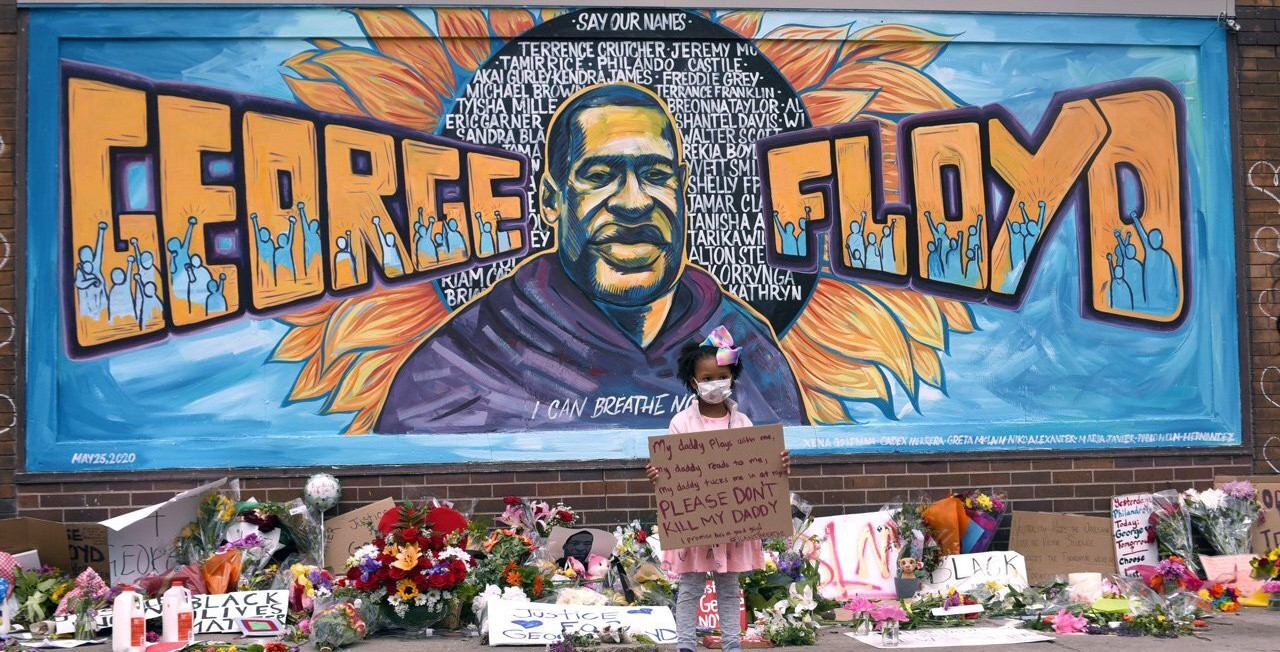

 At that time,
despite the fact that Hilary Clinton failed to "unite America"
behind her vision and values, she said that going forward it is this
shared vision and values which she will continue to push and she called
on her supporters to do likewise. Nothing was said about the fact that
this vision uses aggression and war as negotiation, blames the U.S.
economic decline on China and maintains Russia as the main enemy of the
United States. It was captured in her slogan that the U.S. is the
"indispensable nation," which, of course, makes all others dispensable.
It was expressed by Clinton in 2008 when she said the U.S. could
"totally obliterate" Iran, and in 2011 when she greeted the
assassination of the leader of Libya with the phrase "We came, we saw,
he died."
At that time,
despite the fact that Hilary Clinton failed to "unite America"
behind her vision and values, she said that going forward it is this
shared vision and values which she will continue to push and she called
on her supporters to do likewise. Nothing was said about the fact that
this vision uses aggression and war as negotiation, blames the U.S.
economic decline on China and maintains Russia as the main enemy of the
United States. It was captured in her slogan that the U.S. is the
"indispensable nation," which, of course, makes all others dispensable.
It was expressed by Clinton in 2008 when she said the U.S. could
"totally obliterate" Iran, and in 2011 when she greeted the
assassination of the leader of Libya with the phrase "We came, we saw,
he died."

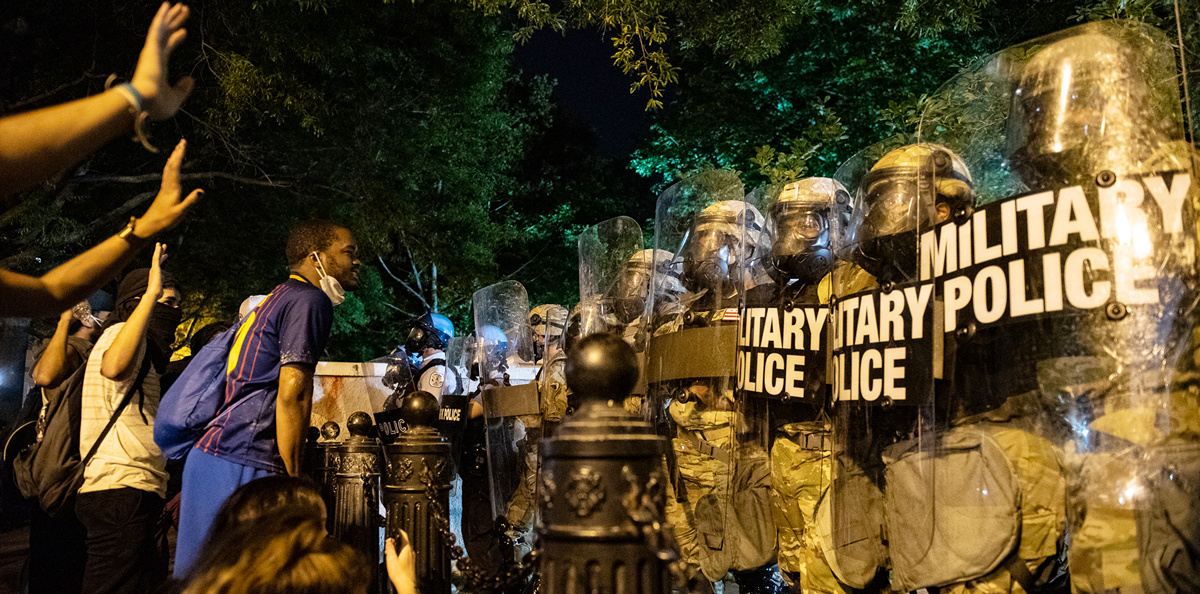
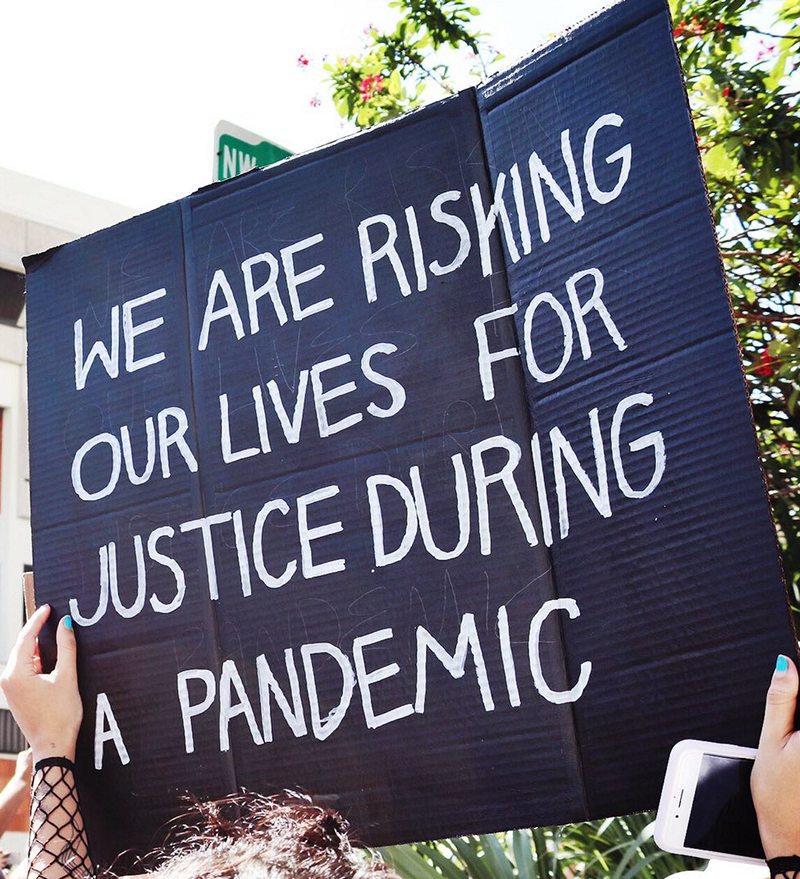 The outrageous
circumstances of George Floyd's killing highlight the inhumanity, daily
injustices and imminent threat to life that the political
disempowerment, impoverishment, class divisions, police brutality and
impunity pose for working people in the United States, especially
African Americans, Indigenous peoples, Puerto Ricans and oppressed
minorities. Floyd was 46 years old. He had a family. He lost his life
after being arrested on "suspicion of passing a counterfeit $20 bill."
Over the course of nearly 8 minutes and 46 second, a 19-year veteran
officer of the Minneapolis Police Department (MPD), Derek Chauvin,
knelt on Floyd's neck while he lay on the ground. Reports indicate that
knee on neck is authorized police procedure. Three other officers were
also present and involved in immobilizing Floyd while he gasped "I
can't breathe" for several minutes and then became unresponsive. None
of the MPD officers attempted to revive him. Chauvin kept his knee on
Floyd's neck even as emergency medical technicians attempted to treat
him. All of this was filmed by passers-by, who the police prevented
from intervening. Two separate autopsies have determined Floyd's
killing to be a homicide.
The outrageous
circumstances of George Floyd's killing highlight the inhumanity, daily
injustices and imminent threat to life that the political
disempowerment, impoverishment, class divisions, police brutality and
impunity pose for working people in the United States, especially
African Americans, Indigenous peoples, Puerto Ricans and oppressed
minorities. Floyd was 46 years old. He had a family. He lost his life
after being arrested on "suspicion of passing a counterfeit $20 bill."
Over the course of nearly 8 minutes and 46 second, a 19-year veteran
officer of the Minneapolis Police Department (MPD), Derek Chauvin,
knelt on Floyd's neck while he lay on the ground. Reports indicate that
knee on neck is authorized police procedure. Three other officers were
also present and involved in immobilizing Floyd while he gasped "I
can't breathe" for several minutes and then became unresponsive. None
of the MPD officers attempted to revive him. Chauvin kept his knee on
Floyd's neck even as emergency medical technicians attempted to treat
him. All of this was filmed by passers-by, who the police prevented
from intervening. Two separate autopsies have determined Floyd's
killing to be a homicide. George Floyd's
brutal and unjust killing at the hands of the police came not long
after two other recent outrageous killings of African Americans in the
name of law and order. On March 13, Breonna Taylor, a 26-year-old
African-American woman, was killed in a raid on her home in Louisville,
Kentucky by police who allegedly failed to identify themselves after
bursting into her home in the middle of the night using a "no-knock
warrant" based on spurious information. On February 23, Ahmaud Marquez
Arbery, a 25-year-old African-American man, was killed while out
jogging near his home in Glynn County, Georgia. His killing was
apparently an act of vigilantism by a former police officer and his
son, trying to find a culprit for thefts in the area. Arbery's killers
were finally charged with felony murder 74 days later on May 4, only
after a video of the killing came to light. These injustices against
African Americans by the failed U.S. state and its police agencies
bring to mind the events of six years ago and the popularization of the
slogan "Black Lives Matter," with the police killing of two
African-American men. The first was 43-year-old Eric Garner in July
2014, who, like George Floyd, died gasping the words "I can't breathe"
while police pinned him to the ground. The second was 18-year-old
Michael Brown, shot by police in Ferguson, Missouri in August 2014.
Many other unjust killings of African Americans at the hands of police
have taken place in the intervening six years. Twenty-eight years ago
four Los Angeles policemen -- three of them white -- were acquitted of
the savage beating of Rodney King. Caught on camera by a bystander,
graphic video of the attack was broadcast into homes across the United
States and the world. Los Angeles Police Department officers kicked him
viciously, repeatedly and beat him with batons for a reported 15
minutes. The video showed that more than a dozen cops stood by,
watching and commenting on the beating. Fury over the acquittal
resulted in five days of rioting in Los Angeles and ignited the
national movement against racial and economic disparity and police use
of force.
George Floyd's
brutal and unjust killing at the hands of the police came not long
after two other recent outrageous killings of African Americans in the
name of law and order. On March 13, Breonna Taylor, a 26-year-old
African-American woman, was killed in a raid on her home in Louisville,
Kentucky by police who allegedly failed to identify themselves after
bursting into her home in the middle of the night using a "no-knock
warrant" based on spurious information. On February 23, Ahmaud Marquez
Arbery, a 25-year-old African-American man, was killed while out
jogging near his home in Glynn County, Georgia. His killing was
apparently an act of vigilantism by a former police officer and his
son, trying to find a culprit for thefts in the area. Arbery's killers
were finally charged with felony murder 74 days later on May 4, only
after a video of the killing came to light. These injustices against
African Americans by the failed U.S. state and its police agencies
bring to mind the events of six years ago and the popularization of the
slogan "Black Lives Matter," with the police killing of two
African-American men. The first was 43-year-old Eric Garner in July
2014, who, like George Floyd, died gasping the words "I can't breathe"
while police pinned him to the ground. The second was 18-year-old
Michael Brown, shot by police in Ferguson, Missouri in August 2014.
Many other unjust killings of African Americans at the hands of police
have taken place in the intervening six years. Twenty-eight years ago
four Los Angeles policemen -- three of them white -- were acquitted of
the savage beating of Rodney King. Caught on camera by a bystander,
graphic video of the attack was broadcast into homes across the United
States and the world. Los Angeles Police Department officers kicked him
viciously, repeatedly and beat him with batons for a reported 15
minutes. The video showed that more than a dozen cops stood by,
watching and commenting on the beating. Fury over the acquittal
resulted in five days of rioting in Los Angeles and ignited the
national movement against racial and economic disparity and police use
of force.